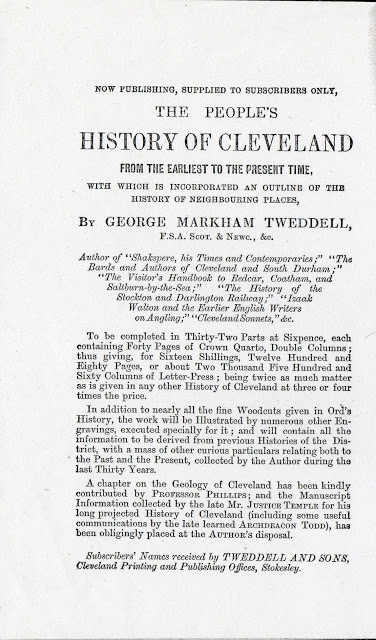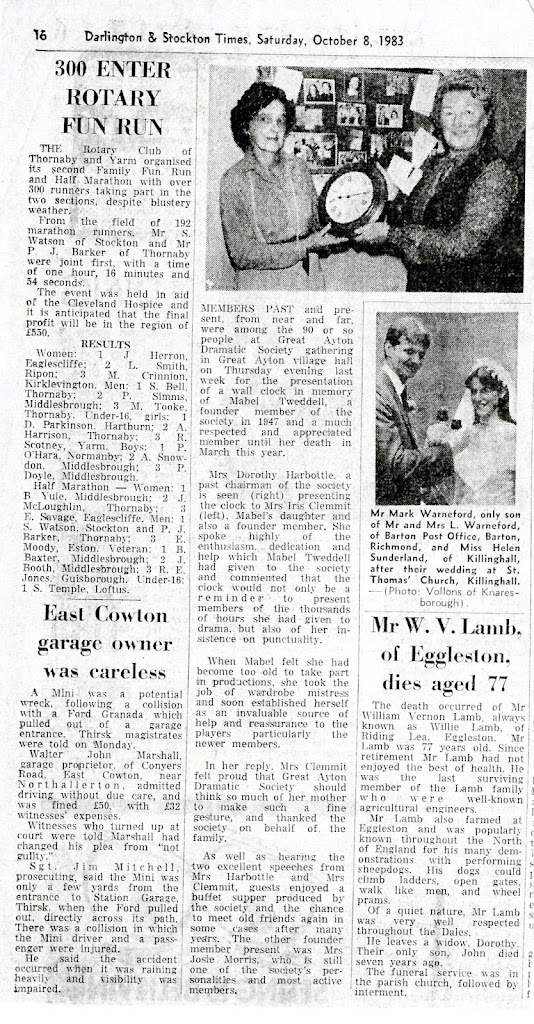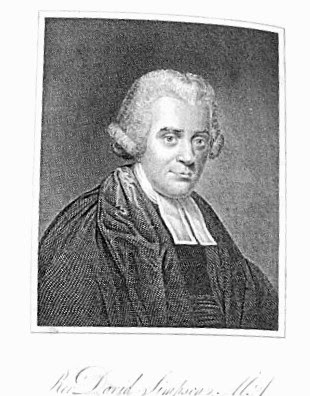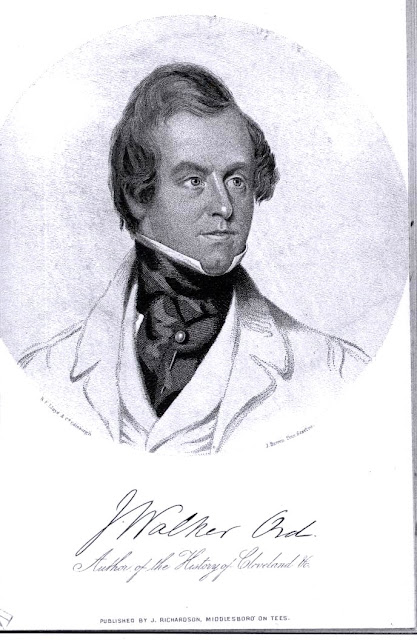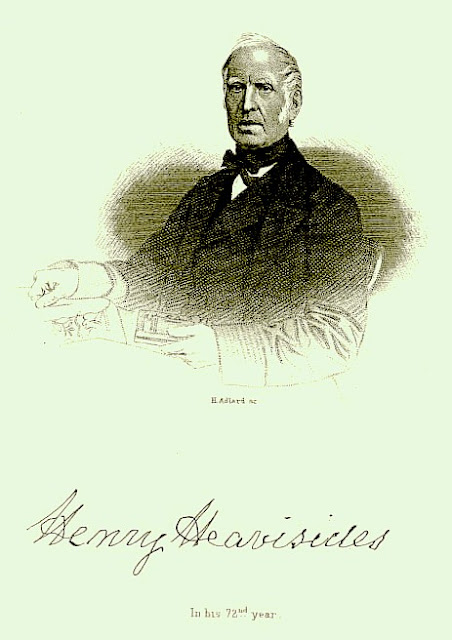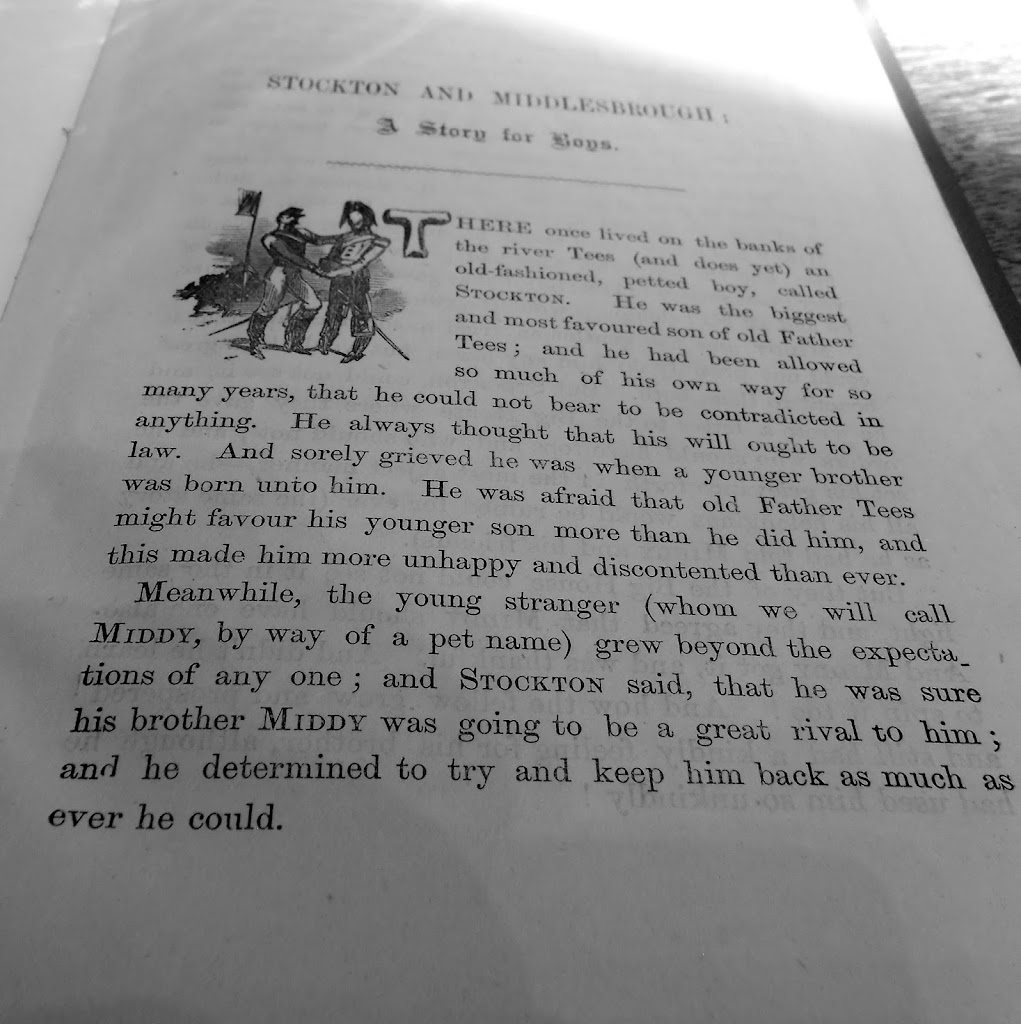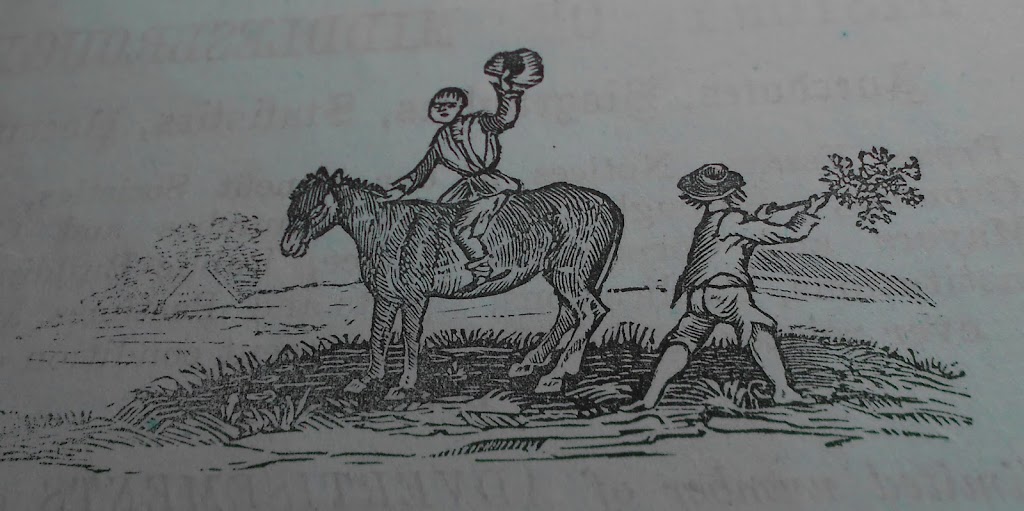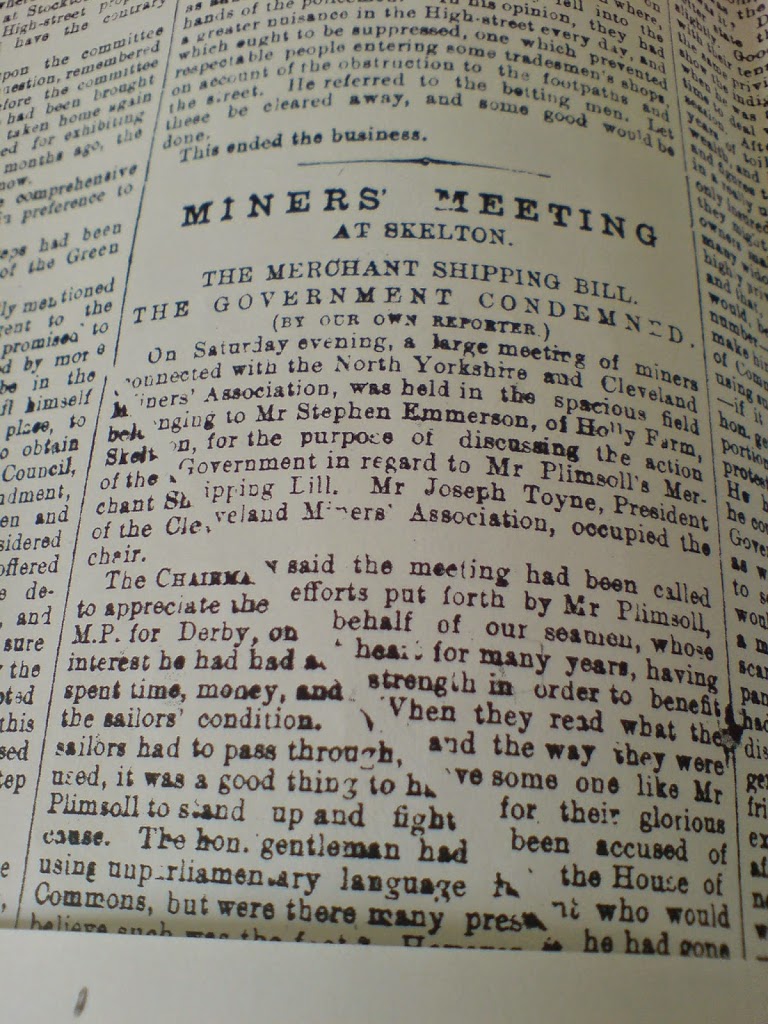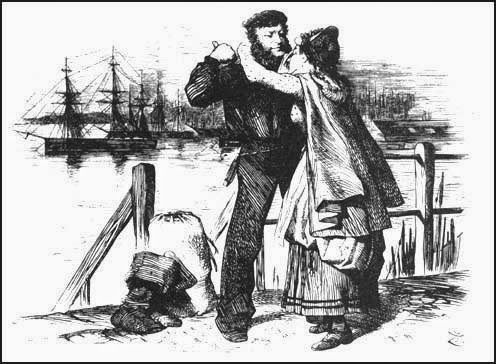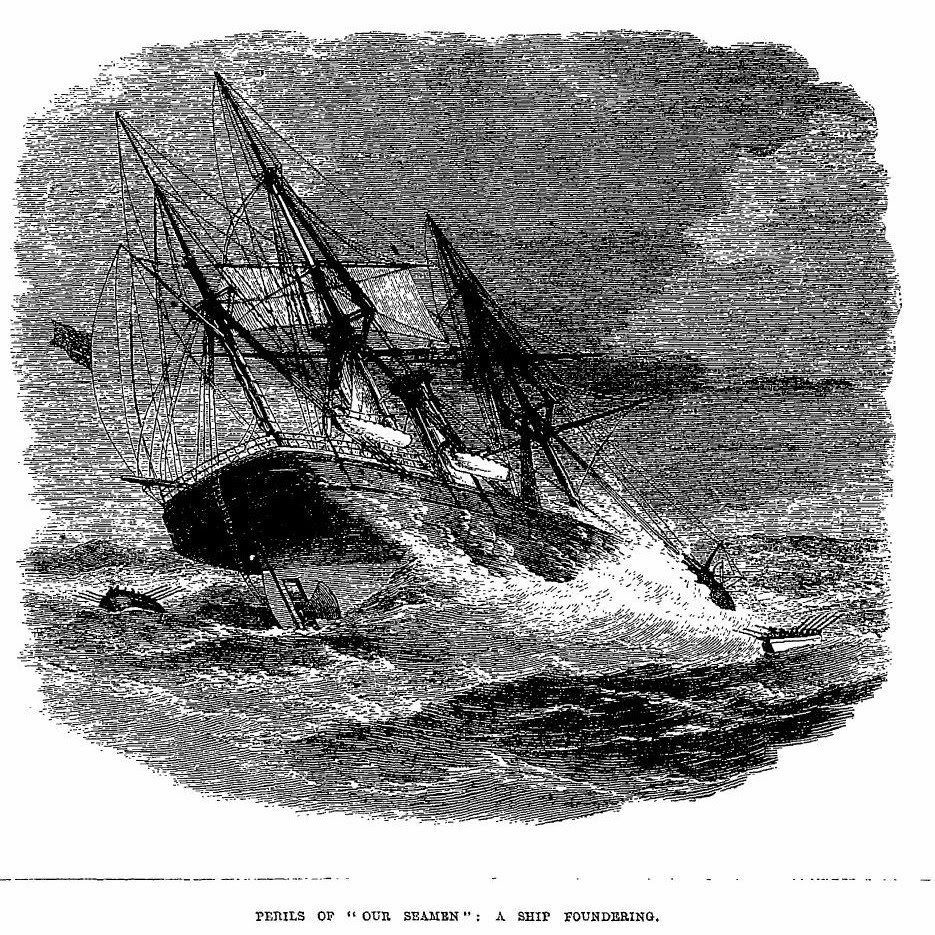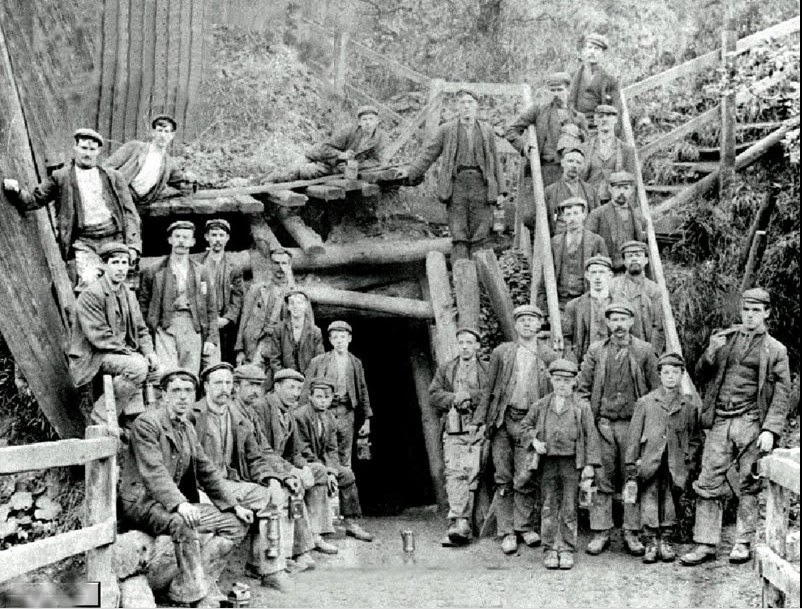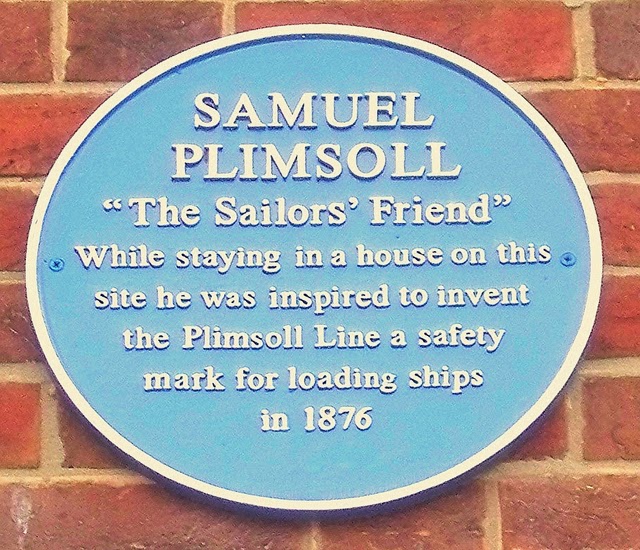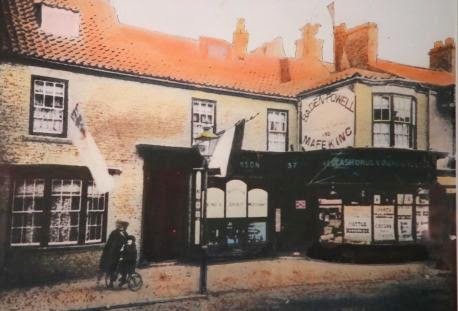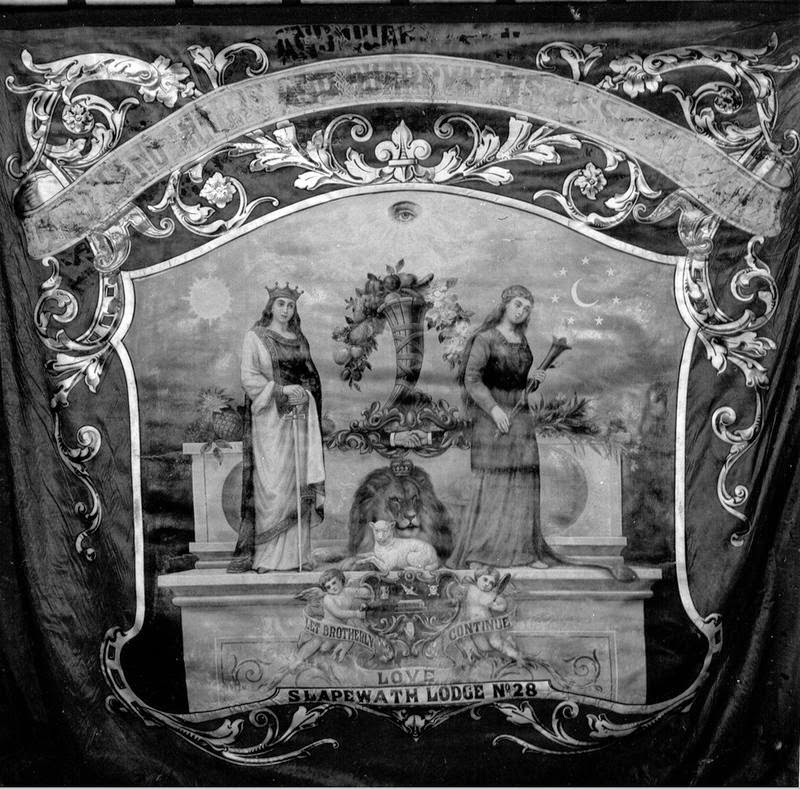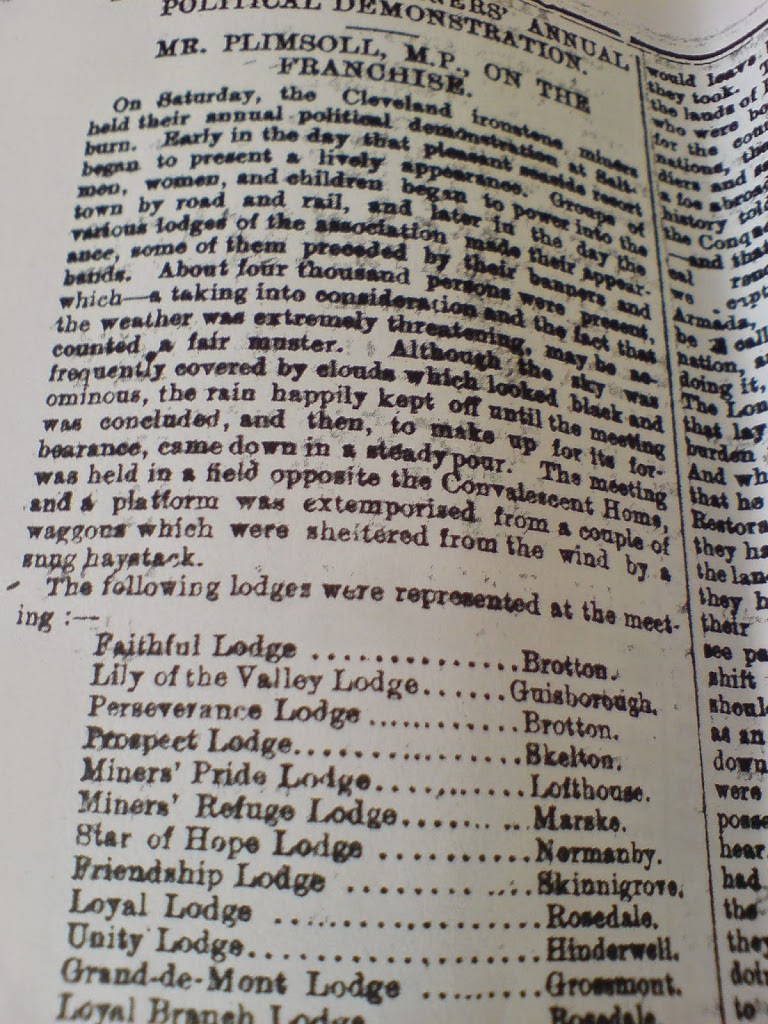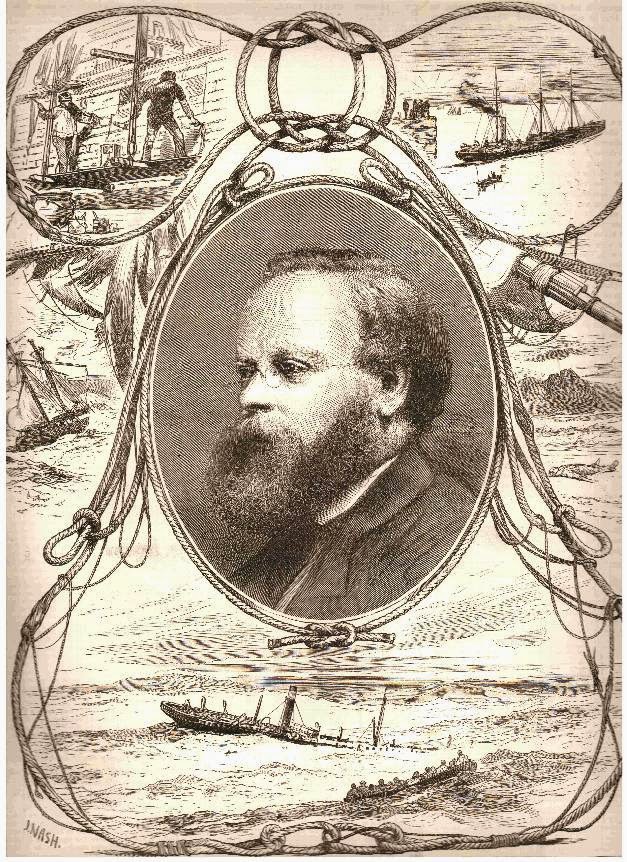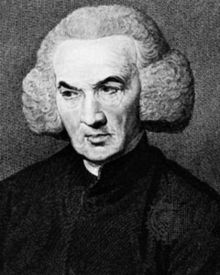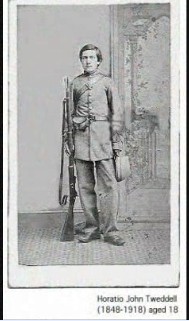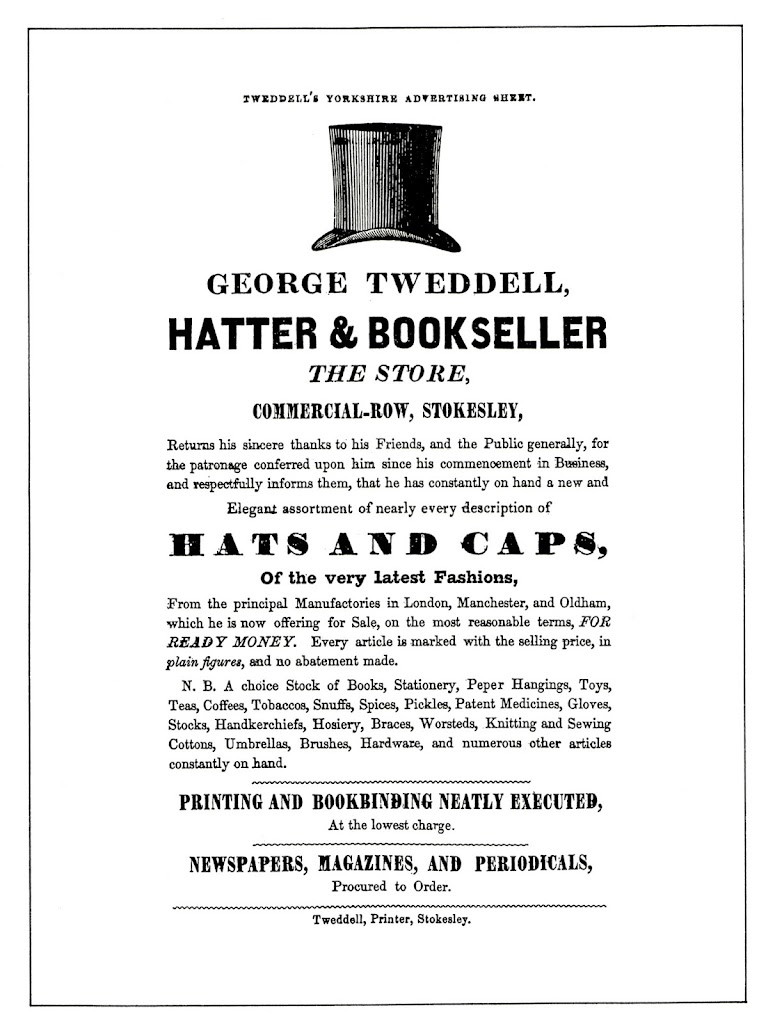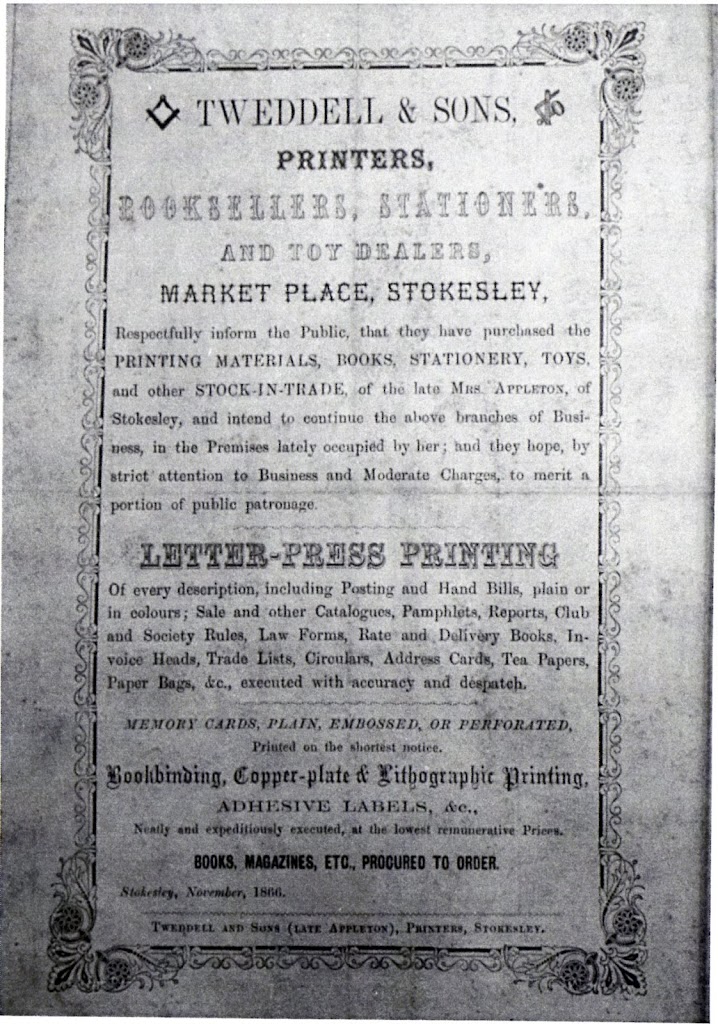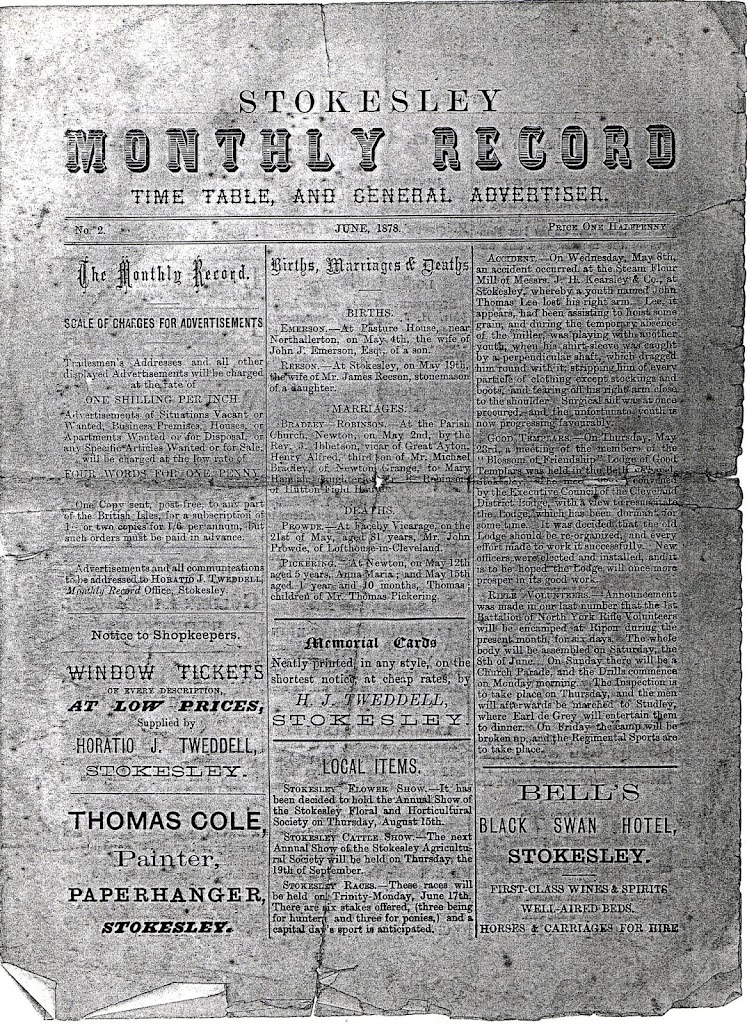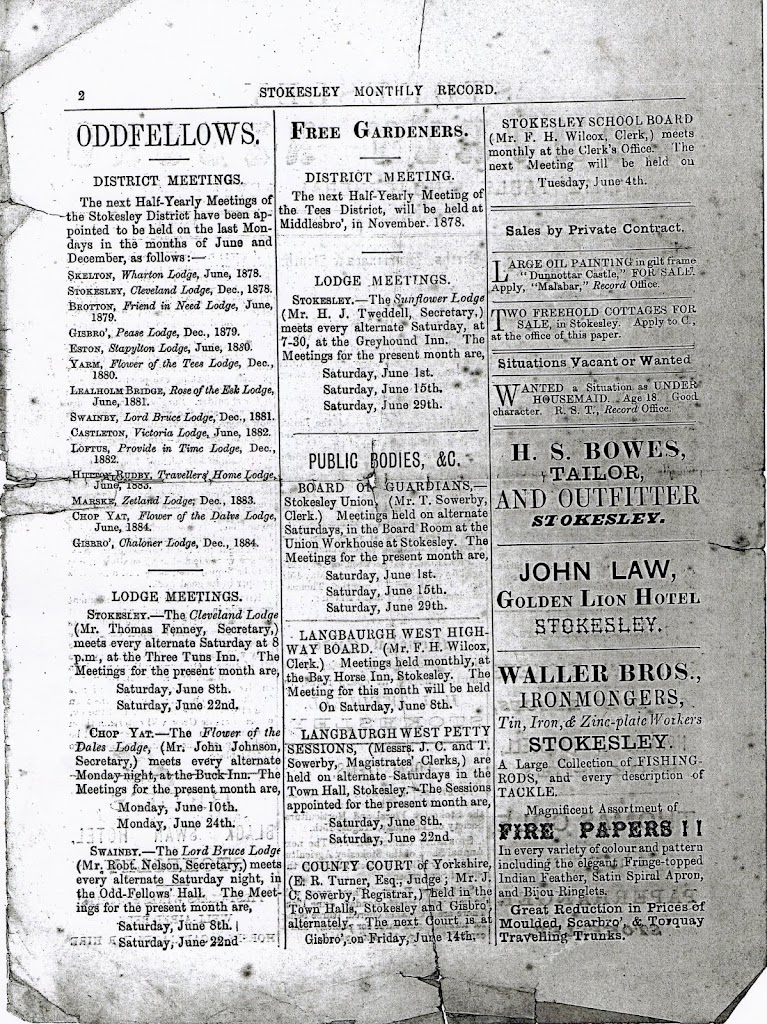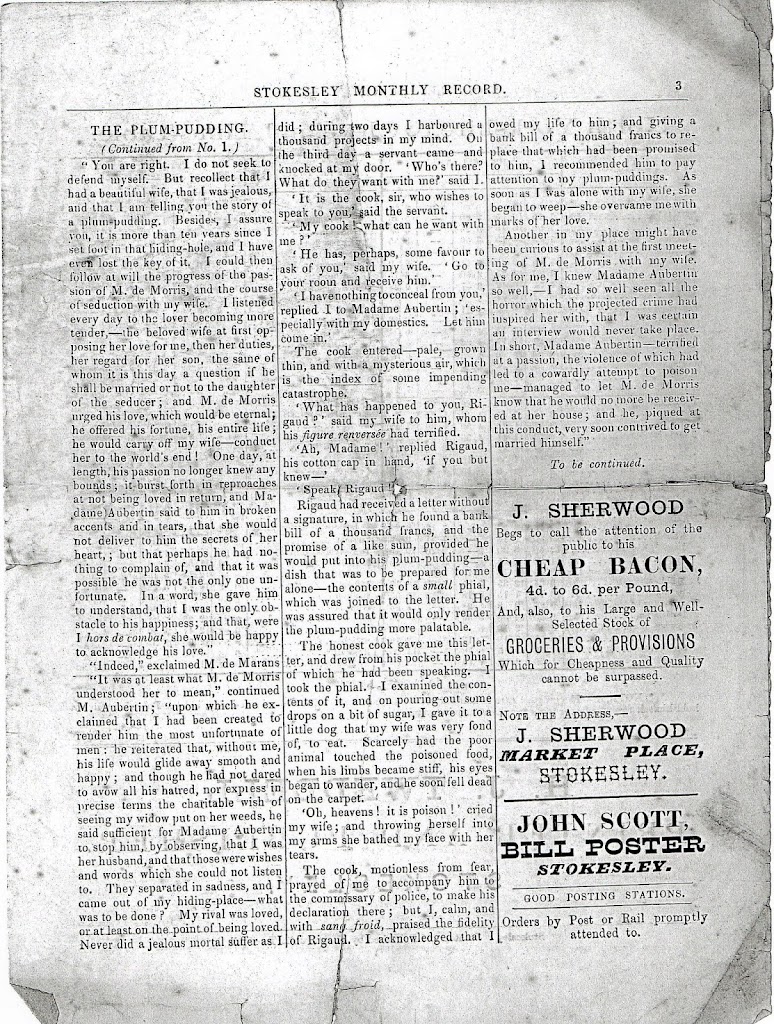Welcome to Artsrainbow. This is your first post. Edit or delete it, then start writing!
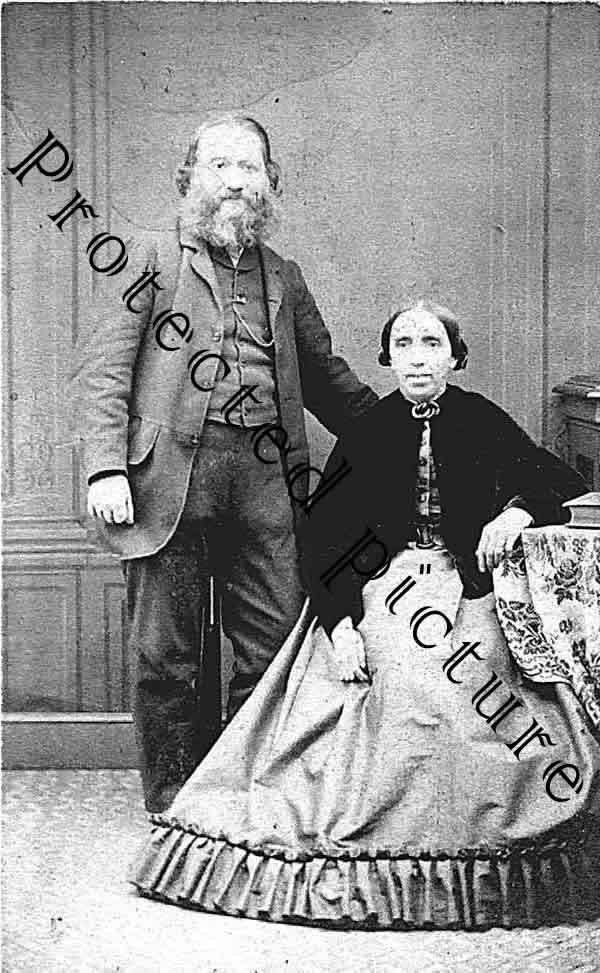
Welcome
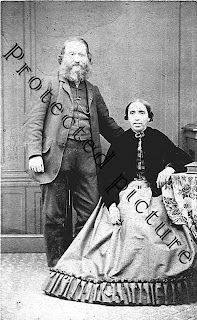 |
| George and Elizabeth Tweddell |
This is a hub for the work of George Markham Tweddell and his wife Elizabeth Tweddell (AKA Florence Cleveland).
THIS POST REMAINS ON TOP AS AN INTRODUCTION.
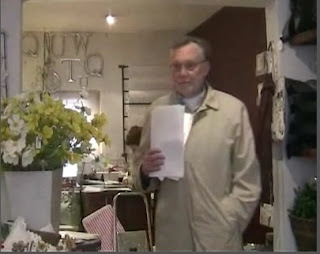 |
| Paul Tweddell in Rose Cottage Stokesley |
This site dedicated to the memory of Paul Markham Tweddell, who in 2005, became a valued friend and associate and unstinting in his dedication to recording and researching the history of his ancestors of ‘modest fame’ as he termed it.
Trev Teasdel
Notes
For those visiting via Coastal view and Moor’s News re- Holly Bush’s article (page 33) on Captain Cook and the proposed pyramid on Roseberry Topping – The original article is here https://www.artsrainbow.com/georgemarkhamtweddell/2013/02/17/captain-cooks-monument-easby-moor-the-mystery-behind-it/
George Markham Tweddell – 1823 – 1903 was born in Stokesley on 20th March 1823 , North Yorkshire, and claimed he was the son of a Royal Navy Lieutenant, George Markham, who had been born in 1797 in the Rectory, Stokesley. His father, another George Markham (1763-1822), was the Rector of Stokesley, whilst also holding the post of Dean of York, and his grandfather was Archbishop Markham (1719-1807), famed for saving the walls of York from demolition in the first decade of the nineteenth century with the help of the author Walter Scott.
About George Markham Tweddell –
- Editor of Radical Newspaper – campaigning against the Corn Laws, Slavery and many other issues of the day.
- A printer, publisher and author of many books including Bards and Authors of Cleveland and South Durham, Shakespeare and his Times and Contemporaries, History of Stockton and Darlington Railway, and many more.
- A prolific, wide ranging and well published poet – world wide, in papers, magazines and anthologies and his own books – and more recently has a collected poetic works published recently by Paul Tweddell and myself Trev Teasdel – with pdfs posted on this site.
- The author of The People’s History of Cleveland.
- A prominent member of the Cleveland Lodge of Freemasons / Odd fellows who published his own 100 Masonic Poems in sonnet form.
- A preserver of the Cleveland dialect.
- A Chartist who had poems published in their paper – Northern Star along side those of Ebenezer Elliot – the Poor Law Rhymer whom Tweddell corresponded with and had poetical exchanges with.
- And much much more!
And on their second album Megson put music to Elizabeth Tweddell’s dialect poem ‘Twaa Match Lads’ called here Two match Lads.
The Longshot by Megson
HERE
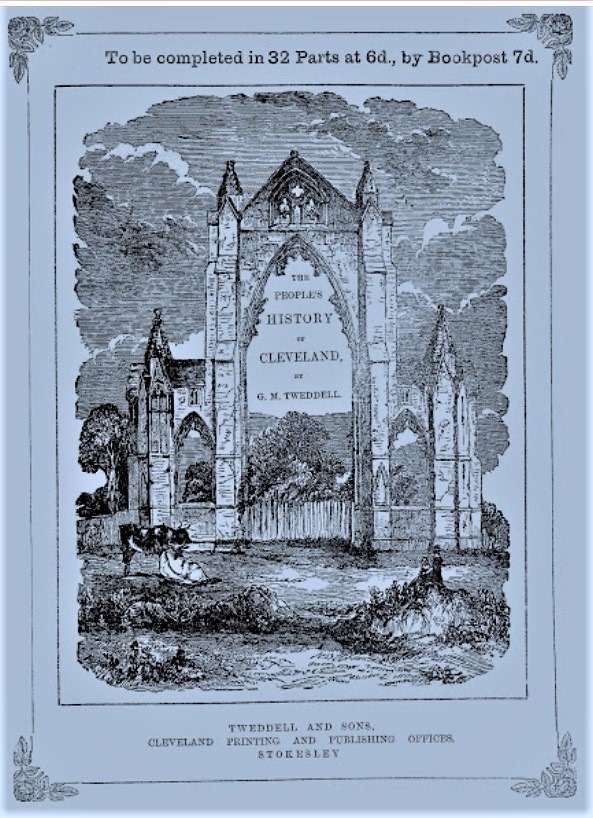
The People’s History of Cleveland by George Markham Tweddell
George Markham Tweddell began writing up his People’s History after he left Lancashire
(Bury), where he was headmaster of Ragged (Industrial) school in the 1850’s.
“..I had left Lancashire to commence writing that History of my native Cleveland and its Vicinage for which i had long been collecting materials, – even before my friend Walker Ord had thought of his or indeed had studied it himself..”
The full works were to encompass 32 parts which, as was the custom, would eventually be made into a book. However only 4 parts were published for some reason and any manuscripts of the materials are presumed lost owing to the fact that after his death, much of Tweddell’s notes and unpublished manuscripts (or those that are not in the Cleveland Archives) were lost in the Stokesley flood of the 1930. They were in the cellar of Rose Cottage in Stokesley and the relatives rescued the books but not is papers. Great shame!
A manuscript exists in Middlesbrough Reference library on Middlesbrough, going back long before the town existed, in a way not covered by other histories of the area, and giving a great description of early Middlesbrough, its staithes etc. Some of this material was used for an extended essay for the Middlesbrough Centenary and is on this site. The manuscript itself is above the Reference library where only staff are allowed, so you would have to ask to see this document. I would think this would have been part of later installments. Historian Asa Briggs consulted it for his Victorian Cities book and the essay on Middlesbrough. View the extended essay on Middlesbrough here – https://www.artsrainbow.com/georgemarkhamtweddell/2012/12/17/tweddells-history-of-middlesbrough-1890/
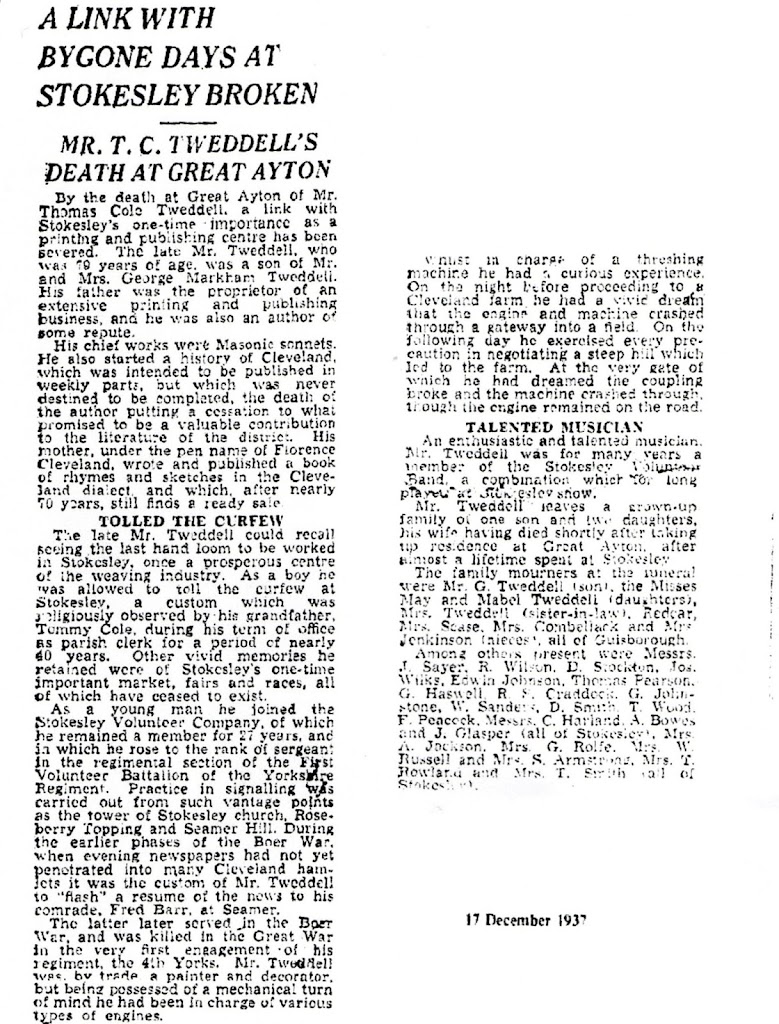
Press Cuttings on Tweddell Relatives
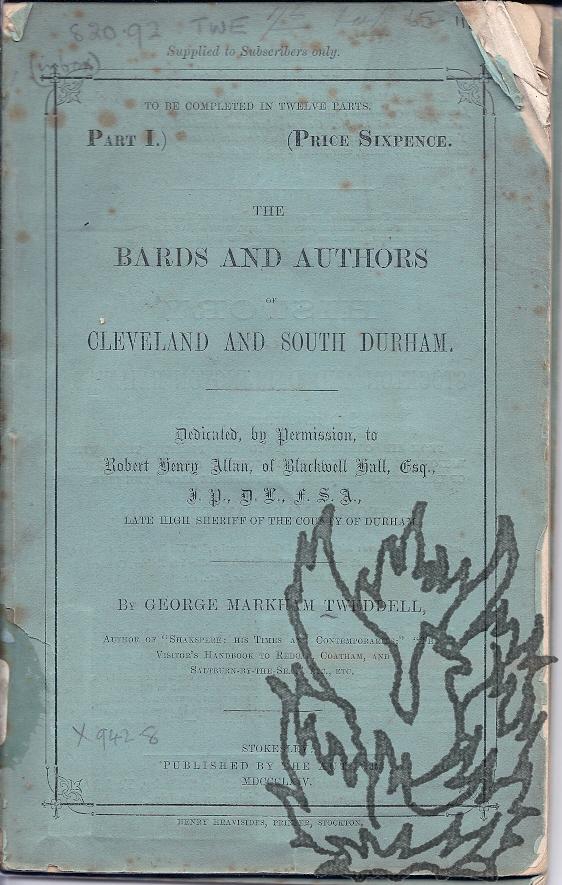
George Markham Tweddell’s Talk for Stokesley Mechanic’s Institute on Local Writers 1850

“We may fairly claim that English literature began hereabouts” WH Burnett 1886 Middlesbrough
Below is one of George Markham Tweddell’s many talks. This one is to the Stokesley Mechanics Institute Sat 9th November 1850 on the topic of Local Writers. But first an introduction….
The Bards and Authors of Cleveland and South Durham 1872
In 1872, George Markham Tweddell published The Bards and Authors of Cleveland and South Durham (which can be downloaded free Here ). It was published at first in instalments before being republished as a full book. It contain an essay and often a woodcut of 37 authors, writers and poets who lived in the area from Whitby, up to Stockton on Tees from as early as 500AD to the 19th century. In the introduction, Tweddell mentions another 103 plus writers which he says “such a monomaniac am I that I meditate preparing a second (mayhap, who knows? a Third) series of Bards and Authors! ‘ The second and third volume never appeared. Any notes or work towards the further volumes would have been lost in the Stokesley flood of the 1930’s along with some of his other notes.
There is more on his book on this site here
https://www.artsrainbow.com/georgemarkhamtweddell/2012/12/24/bards-and-authors-of-cleveland-and-south-durham-1872-pdf-george-markham-tweddell/
WHITBY AUTHORS AND THEIR PUBLICATIONS 1867
Other Books on Early North Yorkshire Bards and Authors
In 1867 Gideon Smales published his book
Whitby Authors and Their Publications: With the Titles of All the Books Printed in Whitby, 670 to 1867 (1867) which covered some of the Whitby authors that Tweddell covered later in 1872.
OLD CLEVELAND – LOCAL WRITERS AND LOCAL WORTHIES 1886
 Old Cleveland – Local Writers and Local Worthies 1886
Old Cleveland – Local Writers and Local Worthies 1886
……………………………….
George Markham Tweddell’s Speech to the Stokesley Mechanics Institute First Meeting Saturday 9th November 1850 – Local Writers.
George Markham Tweddell said – “Mr Chairman, Ladies and Gentlemen, it is rather a formidable undertaking for a poor man like myself, who never, during the whole course of his education, possessed the common auxiliaries of learning – a spelling book and an arithmetic – it is a formidable undertaking for such a one to stand forward, on an occasion like the present, to address so goodly an assemblage of the beauty, the learning, and the talent of his native town. It is at times like this, one is apt to feel a certain weakness at the knee-joints, a palpitation of the heart not arising from disease ; and some how or other the teeth are inclined to dance and chatter in the head. But as the tea has been good, and the music excellent (I always feel good tea to be indeed to be what the poet Cowper terms it, “The cup that cheers but not inebriates.” and all know the inspiring effect of heaven-born Music.) and as I see the bright eyes of the ladies smiling encouragingly upon me, (and I never could resist the potent magic of a woman’s smile,) I take courage and address myself as well as I can, to my task.
The sentiment to which I’m required to speak this evening is that of Local Writers, by which expression, I understand, all men of letters who, by birth or residence, have been connected with this district. Since the programme for this meeting was issued to the public, I have been frequently asked the question “Who are the Local Writers?” and I have promised, during the short space allowed me this evening, according to my ability, to answer the inquiry. It was, indeed, my intention to have consulted a few biographical works and local histories, and to have made out as complete a list as I could of Local Writers, whose productions, nay, whose very names – I am sorry to say, are so little known in this, their own district. Cleveland has never yet done justice to such of her sons as have distinguished themselves in the Republic of Letters ; nay, judging from various circumstances, I unhesitatingly declare, that the majority of you, however intelligent you may otherwise be, are totally ignorant of what literary men have been connected with Cleveland and what have not. I have pencilled down, from memory, a few of the authors connected with this district, giving them, as well as recollection will serve me, in chronological order ; and as it is totally impossible to do justice to any one of our Local Writers in the fifteen minutes allowed me to address you, I must content myself with merely, mentioning the names of such of them as I have been able to remember, trusting that some of you will bear them in mind when you have retired to your own domestic hearths, and that you may endeavour to make yourself acquainted with their writings. – The eastern extremity of this district, Sir, produced one of the most celebrated Anglo Saxon poets in person of a poor herdsman, named Cedmon, who afterwards became one of the monks of Whitby. Near twelve hundred years have swept over the earth since his body mouldered into the dust ; but his writings have survived the dark and troubled centuries, and were printed, only nineteen years ago in London. There is much in the personal history of Cedmon, when stripped of the superstitious legends with which tradition has invested it, to remind us of the Scottish plough boy, Robert Burns. His writings, however, bear much greater resemblance to those of John Milton ; so much so, indeed, that I should unhesitatingly declare him the Milton on the Anglo Saxon period era. One will find specimens of his poems in Sharon Turner’s History of the Anglo Saxons, in Dr Young’s History of Whitby, and in that popular and excellent work, Chambers’s Cyclopeadia of English Literature. The next author to whom I shall refer is an English Historian of the fourteenth century – Walter De Hemingford, who was Canon of Guisbo’ Priory. The original manuscript of his history, I believe, is preserved in the Advocates Library in Edingburgh. This history was published at Oxford, by that laborious antiquary, Thomas Hearne. The next literary name that I remember being in anyway connected with Cleveland is that of Sir Thomas Chaloner, the elder, an eminent poet, statesman and warrior of the Elizabethan period. He is the first of the names connected with Cleveland, and was author of several prose works as well as poems. It was his son Sir Thomas Chaloner the younger, who first began manufacture of alum in England, and published a volume On the Nature of Nitre. Two miles from where we are now assembled, was born one of the most eminent divines of the Church of England, one of the most accomplished scholars of his day, Bishop Brian Walton, whose Polyglot Bible, edited, as it was, in the troubled times of Charles the First and the English Commonwealth, will immortalise his name. Another distinguished divine of the Church of England and a celebrated controversialist, a native of this part was Rev. Henry Foulis, son of Sir David Foulis, of Ingleby Manor. His works, though principally controversial, are not forgotten. Passing now to the western extremity of Cleveland, I find the industrious Thomas Rymer, author of The Faedera in fifteen folio volumes and a View of the Tragedies of the late Age was born at Appleton Wiske. His collection of state papers have been termed “an undigested mass“. I wish the writer, instead of applying the epithet, had digested them for us. Fifty eight manuscript volumes of valuable historical documents collected by Rymer, are at present preserved in the British Museum, for Rymer did not eat of the bread of idleness. If I may be allowed to go a stone’s throw from Cleveland Mr Chairman, in the adjoining parish of Kirby Wiske, we shall come to the birthplace of the tutor of Queen Elizabeth, the learned Roger Ascham, author of The Schoolmaster and other works. The next Cleveland writer to whom I shall refer is one whose name I mention with mingled feelings of pleasure and pain allude to John Hall Stevenson of Skelton Castle, the friend and ‘Eugenius‘ of Lawrence Sterne. I feel proud of this gentleman’s learning, proud of his wit and humour but sorry that his talents were so prostituted. While his Fables for Grown Gentlemen his Crazy Tales and other display the fire of true genius, I deeply regret that the greater part of them are not fit for republication in the present day. Pity it is that true genius should ever be prostituted. Passing again a mere stone’s throw from Cleveland – only crossing the river Tees at Stockton was born one of the most eminent of literary antiquarians – Joseph Ritson, and also a poor rope maker and dramatist. Joseph Reed, a scene from whose farce of The Register Office will be familiar to most of you, under the name of Margery Moorpout. The Reverend W. Wray has alluded to one who may be classed amongst Local Writers, seeing that he prepared the manuscript copy of his second voyage round the world for the press ; and all humanity must regret that his untimely murder prevented him from preparing an account of his third. I refer to that truly great and heroic man, Captain James Cook, who was a son of farm labourer of Marton, and received his education at our neighbouring village of Great Ayton, from whence he went to sea, and became the greatest navigator of his time, gaining for himself immortal renown. The Rev. David Simpson, whose Plea for Religion and Key to Prophecies are so well known, was also a Cleveland man. The only writer that Stokesley has produced in by gone days, that I remember ins Thomas Pierson, the author of Rosebery Topping, a poem, and of some play performed here, a copy of which I have never been able to obtain. And how did Stokesley honour or reward her child of the muse? Why she starved him out! Though the poor poet tried so hard to gain for himself an honest livelihood by following the useful callings of Locksmith, Clock and Watch maker and school master, she churlishly denied him bread, entrusted the tuition of her children to an astrologer and forced to be a poor man of letters to seek shelter in “a small place” in the custom house of Stockton. I must not forget the first historian of Cleveland, the late Rev John Graves of Yarm, whose antiquarian researches were equally creditable to himself and useful to others. But all other parts of our district are insignificant as the birthplaces of men of genius, compared to Gisbro’, – bear witness to William Mason, to William Danby, and that unfortunate bard and historian, John Walker Ord, whose writings alone would require a lecture to do them that justice they deserve. Poor Mason, nearly all his writers seem to have perished with him ; the only specimens of his poems that are preserved are Monody on La Place printed in Blackwell’s Magazine and the pieces given in my own Yorkshire Miscellany. Some of the best of the South Durham poets, Mr Chairman, have been singularly connected Stokesley : Thos Watson, author of The Ruin, my friend Henry Heavisides whose Pleasures of Home deserves to be in the home and heart of every Englishman, and the lamented Edward Marsh Heavisides whose poetical and prose remains I now hold in my hand, These have all spent some years of their lives in Stokesley, though none of the three were natives of the place. The Night by Mr Thomas John Cleaver like the Wildflowers of Miss Ayre was published in Stokesley. One noble name Cleveland possesses in the ranks of her literary men, in the person of Marquess of Normanby, ( The Hon Commodore Constantine John Phipps) and the friend of Charles Dickens, (to his honour be it spoken) and author of the novels Matilda, Yes and No, The Contrast as well as Tales of Arinda (?). and The Prophet of St. Paul’s. I turn now to a humble name, but one which I would not willing omit of a poor stone mason of Danby, John Castillo, author of Auld Izaak and Other Poems, principally in the North Yorkshire dialect. Though not born in Cleveland, the Rev. James Holme, vicar of Kirkleatham, deserves honourable mention as the author of Leisure Musings and Mount Grace Priory and other poetical works. Another clergyman I must not forget to mention, as his name is both connected with Stokesley and the literary world, i speak of our late Rector, the Venerable Levison Vernon Harcourt whose Doctrine of the Deluge I trust will find a place in the library of our Mechanics Institute. Have any of that gentleman’s correspondents, our worthy Rector for instance was to give the hint, I doubt not that he would be willingly present with a copy. And now Sir having mentioned one Archdeacon of Cleveland, I ought to mention his successor, the Venerable Henry John Todd, whose Life of Cranmer, revived edition of Johnson’s Dictionary and other works, have made his name well known in the world of letters. As time allowed me now expired, I shall merely mention two more literary names connected with Stokesley, the Rev Charles Cator and a medical writer Mr Lawson Crummey, whose valuable work on the Diseases of the Skin is of practical importance. Mr Chairman, I think I have now fairly and fully answered the question ‘Who are our local Writers’.”
most celebrated Anglo-Saxon poets, in the person of a poor herdsman, named
…………………..
Editor’s note – it is interesting in that Tweddell included in 1850, some of the poets or authors that never made the first and only volume of Bards and Authors of Cleveland in 1872 but were earmarked for the proposed second and third volumes which never appeared. It means we have at least got some of his thoughts and information on them.
Although very much a work in progress at present, a full list and information of the Bards and Authors of Cleveland for various sources including GMT (for possible further research) will be on this site Bards and Authors of North Yorkshire http://bardsandauthors.blogspot.co.uk/
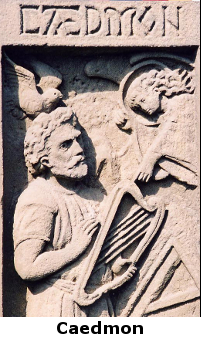 |
| http://www.wilfrid.com/saints/hilda.htm |
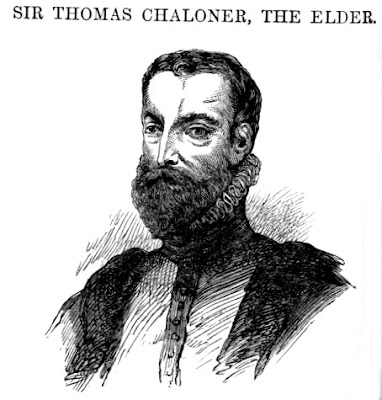 |
| Sir Thomas Chaloner the Elder – woodcut from Tweddell’s Bards and Authors of Cleveland and South Durham |
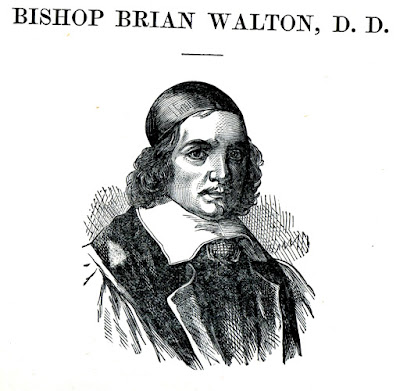 |
| Bishop Brian Walton woodcut from Tweddell’s Bards and Authors of Cleveland and South Durham |
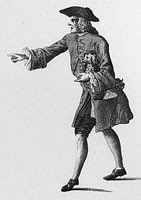 |
| Thomas Rymer http://www.phrases.org.uk/meanings/poetic-justice.html |
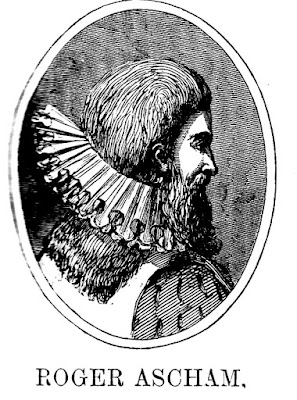 |
| Roger Ascham woodcut from Tweddell’s Bards and Authors of Cleveland and South Durham |
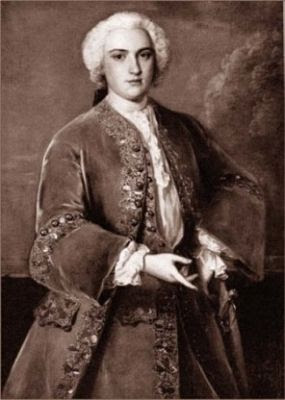 |
| John Hall Stevenson of Skelton Castle. 1718 – 1785. Painted in 1740 by Philipe Mercier. Photo above and below from and more information here http://homepage.ntlworld.com/bandl.danby/Skelton1713_1736.html |
 |
| Laurence Sterne. 1713 to 1768. ……………. Captain James Cook
Thomas Pierson
|

A Story for Boys – Anent the Proposed Tees Bridge. Elizabeth Tweddell 1871
STOP PRESS !
Councillor Dave Walsh has sent an article from the Evening Gazette 1871 which gives some background to the story and it seems the proposal at that time was for a Swing Bridge like the one in Goole but according to William Lillie a transporter bridge was a proposal a year later in 1872. More details below after the story!
Elizabeth Tweddell aka dialect poet Florence Cleveland was wife of poet, printer, author George Markham Tweddell and although from Stokesley, lived in Middlesbrough in the 1860’s to about 1872 when they returned to Stokesley. They lived in Commercial Street, St. Hildas and George ran his print shop Tweddell and Sons at 87, Linthorpe Rd. Middlesbrough (now part of the new Maplin store near MacDonald’s).
“In a country such as Britain, full of running streams, bridges form the essential part of every system of roads connecting the various districts of the Kingdom with each other….The great conveniences of bridges gradually led to their erection along many of the principal fords ; and when the art of Bridge Building became more advanced, they superseded ferries – always an inconvenient, and often a dangerous method of crossing rapid rivers. The bridge brought the inhabitants of certain districts into immediate connection with those on the opposite bank of the river flowing between them, and enabled them freely to hold intercourse and exchange produce with each other.” Dr Smiles – Lives of Engineers.
There once lived on the banks of the river Tees (and does yet) an old fashioned petted boy called STOCKTON. He was the biggest and most favoured son of old Father Tees ; and he had been allowed so much of his own way for so many years, that he could not bear to be contradicted in anything. He always thought his will ought to be law. And sorely grieved he was when a younger brother was born unto him. He was afraid that old Father Tees might favour his younger son more than he did him., and this made him more unhappy and discontented than ever.
Meanwhile, the young stranger (whom we will call Middy, by way of a pet name) grew beyond the expectations of anyone ; and STOCKTON said, that he was sure his brother Middy was going to be a great rival to him ; and he determined to try and keep him back as much as ever he could.
Now some of the friends who were well acquainted with STOCKTON, and wished to show him some mark of their favour, presented him with a very large top, which gave him a great deal of pleasure and profit too. And the top used to spin away daily, to the great delight of STOCKTON ; who felt very proud of being the possessor of such an article as very few had got. But his brother Middy had seen it, and thought that he was big enough to have one too ; and the gentlemen who had given the top to STOCKTON were of the same opinion.
But oh ! had you seen the rage of STOCKTON, when they proposed to give Middy one too. He stormed no little. And then showed his selfish nature. he said, that if Middy had a top, there would be no room for him to spin his, that the top which they had given him had been of very great service to him ; but if they gave one to his brother , he and all his belongings would be quite ruined.
Middy and the gentlemen tried to convince him that it could not possibly do him any harm , but would be a great benefit to them both. But STOCKTON could not see it., and he wrote a letter to the Big House where they gave the orders who should have tops and who should not ; and he set his grievance forth in the most abject manner, – he and his belongings would be ruined forever (the same story he had told Middy and his friends).
But they of the Big House could not see it in the same light, and they agreed that Middy should have one also. And Middy got it and was thankful. And didn’t he learn to spin it too ! And how the fellow grew and prospered ! And still had a kindly feeling for his brother, although he had used him so unkindly !
But STOCKTON always kept sulky, and looked with jealous eyes on Middy, although he never did him any harm at all.
A few years after this happened, a great friend and benefactor of Middy’s made a wonderful discovery. One day, when he was out on the moors, he found a great mass of stone contained iron, and he and another benevolent gentleman, who was a connection by marriage, set to work in good earnest, and erected blast furnaces and made iron in such large quantities, that it would have made teeth for all the peg tops in the world.
And now Middy grew apace, and spun his top so valiantly that the buzzing of it could be heard for miles.
When STOCKTON saw all this, he set to work and built some furnaces too, and derived a great deal of good by the discovery of Middy’s friends. And Middy was delighted to see his brother flourishing so much, and hoped that STOCKTON had quite got over all the angry feeling he had shown towards him. But in this Middy was mistaken.
In the course of a few years, when Middy had got to be a great deal bigger and stronger than his brother, some gentlemen proposed to make a Bridge over the river Tees, so that the two could visit each other more easily ; and they thought it would confer a great benefit on all the people on both sides of the river : And Middy was quite pleased at the thoughts of it.
Not so, however, with STOCKTON. He began to grumble the old way again. MIDDLESBROUGH, as he chose just to call him (giving him his name in full because he was vexed), would get all the good of it. It would do him no amount of harm. He didn’t see why his younger brother should be favoured more than him. However for his own part, he should do all in his power to oppose the Bridge !
Middy tried to reason with him ; but it was all of no use. he had got into the his old stupid ways again, and there was no getting him out of it. Middy told him, that they ought to consider themselves Siamese Twins. That whatever materially affected one, must of necessity affect the other. That he thought they could walk better both together than either of them could do alone. That he had no wish to sever the connection ; but that if it really had to be done, why, as he was strongest, he would have the least to fear about it. That if they got the Bridge, he should be very glad. he did already spend a great deal of money every week on STOCKTON, and he had no doubt that he would spend a very great deal more if the way between them was shortened. But it was like casting pears before swine talking to STOCKTON on the matter.
A lot of Middy’s friends got up a public meeting about the Bridge, and it was highly satisfactory. Only Middy thought that one of his friends made a slight mistake at the meeting, in a remark that he made. But as he knew that it was kindly meant, he did not like to say anything about it at the time. What his friend said was, that Middlesbrough was the place to no place : But Middy says that it both was and is the road to Fortune ; and that it has been a right royal road to a great many, and he hopes that it will still continue to be so. Some people, of course, get muddled in the throng,and cannot find the right track.
I suppose, after a while, there will be a great fuss made by STOCKTON about sending another letter to the Big House, begging of them not to let Middy have the Bridge. How it will end ; remains to be seen. meanwhile, STOCKTON has gone back in it’s corner again, to have his sulk out : and there stands, a warning to all selfish naughty boys.
Middy says, that he will certainly go in for the Bridge, and would very much like to get it ; but if he should not be successful, he will not fret about it as he has so far got along without one. As however, he always likes to encourage all improvements for the general good, he hopes the Bridge will be built whatever STOCKTON may say to the contrary. And he thinks that in the end STOCKTON will find unity is strength.
Elizabeth Tweddell (Mrs G.M. Twedell) Middlesbrough 1871.
MEETINGS OTHER PLACES – NORTH-EASTERN RAILWAY BILL. BRIDGE ACROSS RIVER TEES.
Accreditation the Redcar and Saltburn-by-the-Sea 28/04/1871 Gazette.
THE NORTH-EASTERN RAILWAY BILL BRIDGE ACROSS RIVER TEES
This measure, which has been for the last few days under the consideration of a Parliamentary committee, of which Mr Cross, the member for S. W. Lancashire, is the chairman, was presented by the company in order to obtain powers to construct various short lines and a bridge across the Tees near to Middlesbrough, thus affording a direct communication between Newcastle, the Caulfield of S. E. Durham, and the Cleveland iron district. The only part of the bill objected to was that in which it was proposed to unite the North and South banks of the Tees by means of a swing bridge, which it was contended would almost totally destroyed the trade of the places higher up the river stop the opponents were the corporation, merchants, shipbuilders, &c., of the town of Stockton, whose plea was that the structure would put an impediment to the navigation the river; and the Middlesbrough are corporation who desired to have a roadway in connection with the bridge. The specifications stated that the bridge was to be constructed on the principle of the one at Goole, and was to have the centre opening 130 feet in width, but to accommodate the Stopped and traders, it had been increased to 160 feet, with headway of 30 feet. It was proposed to work it by hydraulic machinery, capable of opening it in a minute and a half stop Mr T. E. Harrison, the engineer to the company, Mr Hawkesley, Mr Fowler, Mr Abernethy, Mr Randall, and other eminent engineers, were examined, and all concurred in stating that the contemplation structures would not effect navigation for ships could be seen when half a mile off, and the bridge opened in time, but that for most of the vessels plying on the river. It would not need opening. It will shown that the only direct means of communication at present existing between the Durham coal field and the Cleveland iron district was by means of the all bridge at Stockton; and if anything should happen to that, the trade of the locality must necessarily be seriously injured, as it would be almost impossible to convey the minerals round by other routes, because of the steep gradients and sharp curves. MessrsI. Lothian Bell, H. W. F. Bolckow, J. G. Swan, W. R. I. Hopkins, and other influential members of the Cleveland iron trade, gave evidence as to the absolute necessity for additional and more direct communication; after hearing which the chairman, said the committee were quite satisfied as to the need of a connection, but wished to confine their attention to the depositions as to the impediment that would be placed in the way of the navigation. Mr Harrison on the part of the company, agreed that the demand of the Middlesbrough Corporation relative to the footway should be acceded to; and their petition, which had only been filed in order to secure what they had thus obtained, was withdrawn stop Mr Dixon, shipbuilder, Middlesbrough, supported the measure, though his firm often sent large vessels to Stockton to the engined; and he made it appear that if the trade of Stockton were injured that of Middlesbrough would be similarly affected, and the prestige of the river would be damaged. Several pilots and ship-owners spoke in favour of the bill stop for the opposition Stockton Corporation said that the bridge would cause a serious decline in the trade of their port, and that if one accident happened there, the ship-owners would leave the place, as the rates of insurance would be so heavy stop if the centre pier were built as proposed, in the middle of the river, a strong current would be formed, and it would be difficult to steer a large ship through in safety, particularly if the wind was unfavourable stop. They made it appear that a tunnel, which would be no obstruction to the navigation, could be made for £50,000, whilst the bridge would cost constantly more. The company, however, stated that if a small tunnel was constructed. They could not in the short distance between the mainline and the right bank of the river get a game on a level with the former, so as to make it useful. Mr Jos. Dodds, M. P., Mr G. N. Duck, Mr Lockwood, Mr Anderson, and others spoke as to the danger of the direction; and several pilots and ship-owners from Goole showed that the trade above the bridge had materially decreased in consequence of the accidents that had happened. On Wednesday, the committee decided that the bridge scheme would not be approved; but it is understood that if the company should undertake to make a tunnel, according to suitable plans, no opposition would be put in the way by the corporation or traders of Stockton. The Tees Conservancy Commissioners will also agree to the proposition, but it has been stated that the company cannot under any circumstances accept the alternative of a tunnel.
…………………………………….
Councillor Dave Walsh further comments
“Interesting too, in that the new “Combined Authority” for the Teesside Boroughs has, as one of its infrastructure proposals, a new Lower Tees Crossing to take pressure off the A19,……………
You can see, in the line up of the pros and antis that it was the massed ranks of the ironmasters against the Stockton port interests,
I don’t know, but will assume the HoC Ctte di#; not approve the private bill. Looking at the map, I guess the NER proposal was for a line diverging from the existing Durham Coast line south of Seaton Carew and following the route of today’s A178 road to a crossing point near where the transporter now is and from there straight into the ironmasters district. The topography would not allow for a high level bridge, and so a swing bridge was the logical solution from a railway point of view. A tunnel would have been difficult too, given the high water levels around the area and the fact that the area is based on slippery boulder clay, and would have meant building in substantial and expensive cuttings on both sides.”
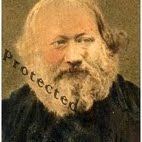
Speech to the Cleveland Ironstone Miners Union Skelton 1875 by George Markham Tweddell
Contributed by Councillor Dave Walsh – a verbatim report of the Cleveland Ironstone Miners union Political demonstration , Skelton in Cleveland, August 1875
In this article, George Markham Tweddell pays his first visit to address the Ironstone Miners of East Middlesbrough Daily Gazette –
 |
| George Markham Tweddell |
Cleveland. Some of his offspring were ironstone miners and George follows on from the previous years meeting, led by Samuel Plimsoll (in the post below this one). By 1875 Plimsoll’s Merchant Shipping Bill had been rejected by Disraeli’s Government for no good reason, leading Plimsoll to use ‘unparliamentary language’ in response. The miners stood behind Plimsoll because he was one of the few MP’s at the time champion the interests of the working classes and in particular the sailors who were being sent to sea in unseaworthy vessels so that the ship owners could realise the insurance at the expense of lives. In the article we also witness the early fielding of potential union candidates to the Liberal Party to represent the interests of the working class some decades before the formation of the Independent Labour Party. Here is the article from the Middlesbrough Daily Gazette –
……………………………………………………………………
Middlesbrough Daily Gazette August 1875
MEETING AT SKELTON
Merchant Shipping Bill –
Government Condemned
Our Own Reporter)
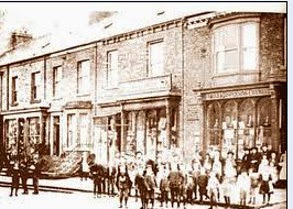 |
| Skelton High Street |
Saturday evening, a large meeting of miners connected with the North
Yorkshire and Cleveland Miners Association was held in a spacious field belonging to Mr Stephen Emmerson, of Holly Farm, Skelton for
the purpose of discussing the action of the Government in regard to
Mr Plimsoll’s Merchant Shipping Bill. Mr Joseph Toyne, President of
the Cleveland Miners Association, occupied the chair –
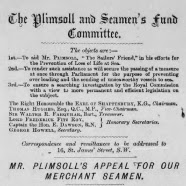 The
TheChairman said the meeting had been called to appreciate the efforts
put forth by Mr Plimsoll MP for Derby, on behalf of our seamen, whose
interest he had at heart for many years, having spent time and money
and strength in order to benefit the sailors’ condition. When they
read what the sailors had to pass through and the way they were used,
it was a good thing to have someone like Mr Plimsoll to stand up and
fight for their glorious cause. The hon gentleman had been accused of
using unparliamentary language in the house of Commons, but were
there many present who would believe such was the fact. However, he
had gone too Merchant Shipping Bill had been shelved and Sir Chas.
Adderley, president of the Board of Trade, had introduced another
Bill, as the Government were obliged to agree to some measure of the
kind to appease the mind of the people. However a blow had been
struck at the Tory Government, Mr Plimsoll was the man who had struck
the blow, and nothing better could have helped the Liberal cause. The
Government knew that thousands of countrymen might loose their lives
next winter and thousands made widows and orphans, and yet they threw
up Mr Plimsoll’s Bill. This proceeding cause the hon gentleman to
say what he would never have said had they acted otherwise. The
Cleveland miners had hitherto shown a warm heart for Mr Plimsoll;
when help was required for suffering humanity they had always shown a
willing hand and a ready heart. He was glad to see so many present
who sympathised with the cause of the poor sailor.
far, he made an apology. As they were aware Mr
Plimsoll’s
Markham Tweddell, of Stokesley, F.R.S.N.A. (Fellow of the Royal
School of Naval Architecture.)..copen etc., then moved the first
resolution, as follows –
the withdrawal by the Government of the Merchant Shipping
Bill, the
most important measure on the Ministerial programme, is a blunder
which calls for the condemnation of the country and fully justified
the outburst of honest indignation with which the announcement was received by Mr Plimsoll in the House of Commons.” –
think it worth while wasting time in trying to convince one of the
justice and the importance of the bill as that of Mr Plimsoll’s. The
very fact that so many were then present who approved of the cause
they were met to advocate, showed that they, like him, approved of Mr
Plimsoll’s conduct and regarded the withdrawal of his bill as at
least a blunder – if that were a proper expression, though he felt
they must use a much stronger one, as with regard to to the use of
language opinions differ. Politicians told us that a blunder was
worst than a crime but he confessed he could scarcely see that,
though they could plainly say the withdrawal of Mr Plimsoll’s bill
for the protection of of the seamen was both a blunder and a crime.
(Cheers.). That it was the most important measure on the Ministerial
programme he thought any cool observer of Parliamentary business must
at once admit , because there was no other bill that might not have
been deferred for twelve months without any loss beyond that of
pounds, shillings and pence. No one of common sense would say that
the lives of British or any other seamen were of less value than
money. Perhaps, however, some people thought so; as if they looked at
legislature of this and every other country they would find that the
laws had protected property more than persons. A man might be guilty
of of great outrages against the person, and yet suffer less penalty
than if he had injured property. But he maintained that the first
element of civilisation was to protect life and property, but the
protection of property should not come before that of life. He felt
delighted when he read of the outburst of honest indignation
exhibited by Mr Plimsoll. He had remarked that of course the hon
gentleman have to say he was sorry if he used unparliamentary
language, but it had gone forth and done its work, and Mr Plimsoll
would not withdraw the principal part of what of what he had said. he
was glad to see that public meetings were held throughout the country
in support of the Merchant Shipping Bill, and was delighted to find
that the first meeting of the Cleveland miners on the question would
support such a resolution as the one he had moved. He remembered
reading many years ago some old Roman translations in the name of
Terence, who spoke to the effect
anything that regards humanity could be handed to him”
quote
am a human being, I consider nothing that is human alien to me.”
This appeared in his play Heauton Timorumenos.”) Ed
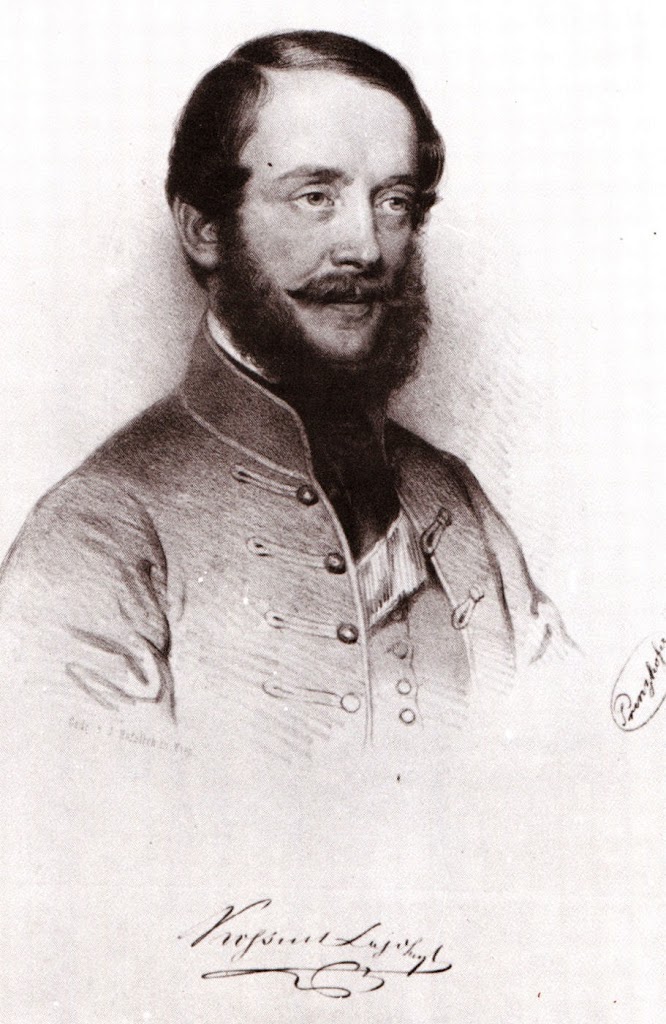 |
| Louis Kossuth |
speaker) wished everyman were actuated by the noble – great, if they
liked – principle of of the good old Latin writer. Public opinion now
ruled the country, and it was by a well educated and noble expression
of this opinion that, whatever the form of Government, the people
would be rulers..
who thanked the people for the interest they felt in in the cause of
the down-trodden nations, and said that everyman possessed some
influence for good, whereby many an evil deed might be prevented.
Every man should act upon this sentiment. The mighty ocean was made
up of drops of water from the clouds. Humanity was made up of units.
By everyman and woman knowing their rights, and daring to maintain
them, the liberties of the country were preserved. he did not think
that the resolution he had moved required much pleading for. he
should feel thoroughly ashamed of any persons who would not hold up
their hands in support. He complimented the Cleveland miners for
coming forward to support Mr Plimsoll in his glorious cause. The
bread winners who risk their lives in the mines acted nobly in
supporting those who risked their lives at sea. It was only by the
working classes of one craft being true to the classes of other
crafts that their positions could become greater than in the past. If
they looked at the
history of the past in every country, even the
most civilised, they would see that the position of the working
classes had been but one of slavery. But he believed that the working
classes of the present day occupy much higher positions than the
working classes ever occupied in bygone ages ; that the working
classes of England fill higher positions than those of any country –
unless it be the United States where the people were sovereigns. When
we spoke of our liberties we were in the habit of calling them
privileges instead of rights. In America they speak of them as rights
and not as privileges. Let them them do away with the notion of
privileges, which could only pertain to the privileged classes, and
go in for that of rights, and one of the greatest rights was to see
that rotten ships were not sent to sea, to risk the lives of honest
men for the sake of dishonest traders. he respected the labour,
whether of mind or body, which was useful but could not see how a man
who sends rotten ships to sea in order to put money in his pocket was
a useful member of society. he thanked them for the patient hearing
they had given him. It was the first time he had spoken but he hoped
it would not be the last time he would have the pleasure of
addressing the Cleveland miners. (Cheers).
Snow (Lofthouse) seconded the resolution. he said that every man
should feel its his duty to
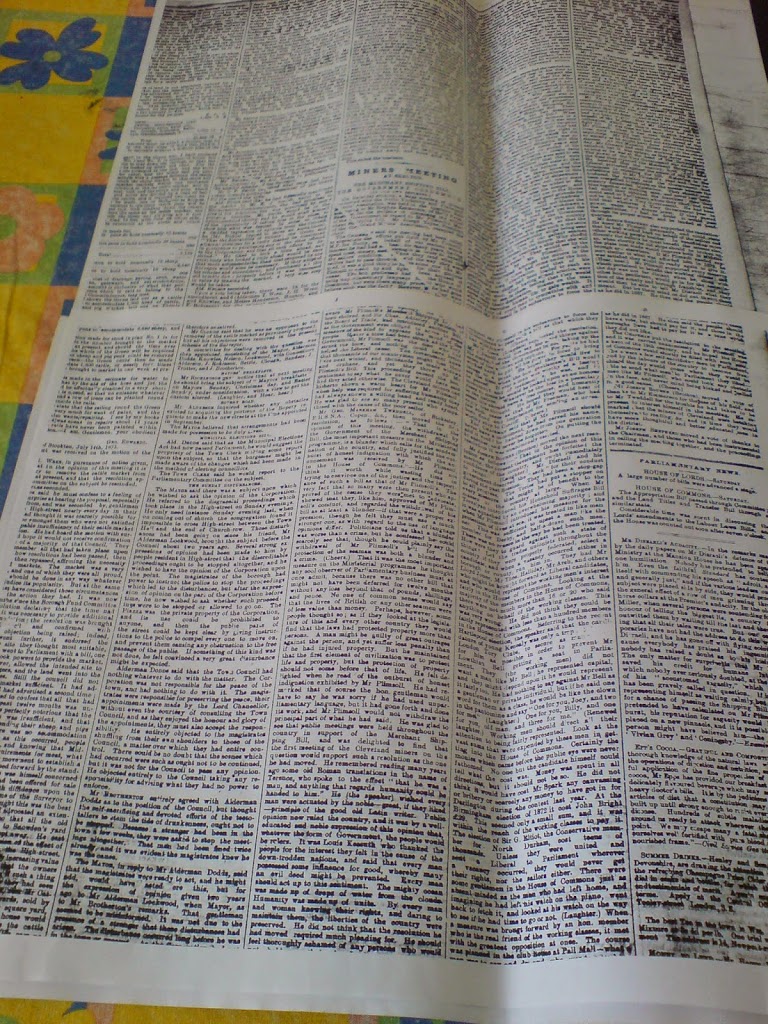 |
| The article as it appears in Daily Gazette |
sympathise with Mr Plimsoll, and to
support the resolution. It had been truly said that the merchant
Shipping Bill was the greatest measure on the Ministerial programme.
By the passing of it perhaps 500 or 1000 lives would be saved during
the coming winter, but by the withdrawal of it, the same number might
be lost. Why should the Government throw out a bill whose object was
to save human life, and keep on the programme bills which were to
protect wealth and property? They had thrown out the Merchant
Shipping Bill to keep up the Agricultural Holdings Bill? There was no
comparison between the two measures . What was the Agricultural
Holdings Bill? What use was it? Did it leave the tenant farmers in a
better state than before? If it did so it was very slightly. Good
landlords would make good bargains with their tenants before and by
this bill they had the same privilege. Mr Plimsoll had the right to
show indignation and the wrath which he did when he was told by Mr
Disraeli that there was no time to deal with the Merchant Shipping
Bill this session. After Mr Plimsoll had spent years and years in
toil and search, pound on pound of his wealth and broken down his
health to obtain facts and figures to prove that many ships went to
sea in a very unseaworthy condition ; that they were only insured and
sent to sea in a rotten state so that they might sooner go to the
bottom and the owner make more money on them, knowing many how many
widows and orphans were left destitute in this highly privileged
land by the greed of shipowners; and that by, by this bill being
thrown out , many more would before winter was over, be added to the
number – it was enough to raise his temper, and make him use the
language he did use in House of Commons.
Plimsoll had good grounds for using such words as ‘Villains’ and
‘scoundrels‘ – if it were true – then
they could not blame the hon.
gentleman so much. But he had withdrawn a portion of the language he
used, and yet not the protest which he laid on the table of the
commons. he hoped Mr Plimsoll would show the country he could bear
out his facts and figures, so that the Government should be forced to
pass such a measure as would prevent any unseaworthy ships being sent
to sea and thus the lives of our gallant seamen would be better
protected in future. Why should a man be allowed to so overload a
ship that she will scarcely float above the water? They would see by
the pamphlet issued by Mr Plimsoll, which had been distributed
amongst the miners in the district that many cases had come under the
hon gentleman’s own observation and that of his friends, where ships
had been loaded to such an extent that men, after having signed
articles, were afraid to go to sea in them, feeling that they would
never reach their destination. Shame on the man who would sacrifice
human life to gain wealth. It was the duty of every man to sympathise
with and support Mr Plimsoll in his endeavours to force the
Government to pass such a bill as that which they had withdrawn.
(Cheers)
(Lingdale) supported the resolution. Mr Plimsoll could not say too
hard things against the Mr
Freeman who had been fined and imprisoned for sending an unseaworthy
ship to Cardiff (Cheers).
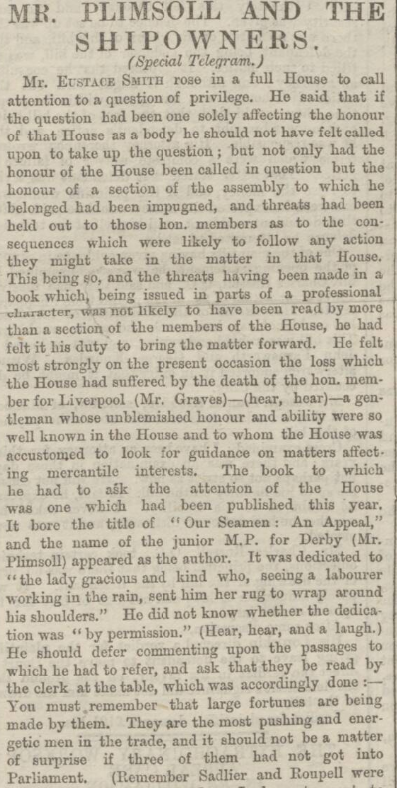 conduct of the Government in not taking up
conduct of the Government in not taking up
the cause of the widows and orphans. For years he had worked hard to
put all his power in force to bring things to a point. He hoped they
would live to see a time when the hon gentleman’s bill would be
passed. If ever a man was worthy of a lasting monument and of
testimonies, he was, and in years to come he would be looked upon as
an honour to the nation. Whatever should be the loss in a particular
sense, life should have a free course, and humanity enjoy free
thought. he hoped they would hear of few such cases as that of
Chairman said that if Mr Plimsoll should never have a monument, he
had carved his name and it would be handed down from one generation
to another, and never be forgotten. On putting the resolution it was
unanimously carried.
Bourne (Brotton) moved the next resolution as follows ; “That in
the opinion of this meeting, the present Government has forfeited the
confidence of the country, and ought to immediately resign.”
(Laughter) Mr Disraeli and his Government deserve the “sack”
for their conduct during the present session. They had been a
‘stop-gap’ to all progress. The Tories had put a stopper on every
that might be of benefit to the masses or the country at large. When
Mr Trevelyan introduced the Household Suffrages Bill it was squashed
by an overwhelming majority. ; and when Mr Plimsoll introduced his
measure for the protection of those at sea, it was treated in like
manner. This was sufficient to upset a man like the member for Derby,
and half a dozen such men. There was no reason in the way he had been
treated. How were they to guard against such a state of things? let
the trade unionists throughout the country, if they were properly
federated, select a candidate, and when a vacancy occurred in either
borough or county, run him in. They had Mr Lloyd Jones, Mr Thos
Halliday, Mr Arch and others who might be brought forward as Liberal
candidates and who would represent the working men’s interest
fairly in the house of commons. Looking at the majority of the
members in the House of Commons, there were not much more than 16 or
20 who said anything on behalf of the working classes. This was very
wrong. He did not think they could be fairly represented with less
than a hundred members in the House of Commons. Referring to the
recent Hartlepool election, the speaker said that the candidature of
young Kenealy was only a trap by the London Tory Clubs to secure as
many votes as possible in order to prevent Mr Lowthian Bell getting a
seat in parliament. They (the working men) did not did not want a man
like Mr Bell ; he represented capital and they might depend upon it
he would represent it fairly too. He had nothing to say against Mr
Bell as a gentleman or private individual, but if he said one word
for them as a class, he would be like a clown in the pantomime and
say “ One for you, Joey and two for me (Laughter) one for you
Billy, and one for you old man, and three for me.” (Renewed
laughter). Working men should direct all their attention to being
fairly represented. Look at the vast sums that were expended by these
men in getting into the House of Commons. Certainly the monies which
came before the public eye were never fathomed. No one but the
candidate himself could tell what the cost was. Money was spent on in
all directions but it should not be so. He did not think it would
have cost Mr Spark any canvassing or bribery or scarcely any money to
have got in for Darlington during the contest last year. At the
Birmingham election of 1872 it cost John Bright £29. This seemed
only a small sum, and it was within reach of the working classes to
pay it. The election of Mr Elliot, the Conservative member for North
Durham, cost tens of thousands. Unless they were united and sent a
Liberal to Parliament wherever a vacancy occurred, they would never
get their rights, nor sailors either. There were some gentlemen in
the House of Commons just as absent minded as the men who had left
home, and imagining he had left his watch on the piano, went back to
fetch it, and looked at his watch on the way to see if he had time to
go or not. (Laughter) When a measure of was brought forward by an
hon. Member who is the real friend of the working classes, it met
with the greatest opposition at once. The course was planned in club
house at Pall Mall what a man was to say and do and who was to pay
him. They required to give the matter their earnest and sincere
attention. When their secretary sent petitions to be filled up, they
should work earnestly to fill them up in a correct manner ; it was
only by petitioning that they might hope speedily to make their
influences felt in the Houses of Commons. In 1866 when John Bright
was agitating for reform measures, petition sheets were carried into
the House of Commons which weighed 25cwt, and two men were occupied
one night carrying out of the street into the House. The measures
were passed ; and if they aroused themselves, they would be
successful also. Mr Trevelyan intended to bring in a Bill next
session, which, if it were passed, would justly benefit them and the
working classes at large. They must give their earnest attention to
the matter in the coming winter and endeavour to get the measure
through Parliament. If they did not work and watch they would never
get a step in advance of their present condition. If they were all as
unanimous as he was, Mr Disraeli would be removed at once. There were
clever men who would gladly handle the reins of Government, if the
working class would only work together. If Mr Gladstone were backed,
he would take command next week. They would never have a finer
Statesman, politician or leader of the nation, than they had in Mr
Gladstone. (Cheers).
James Philbrick (Brotton) seconded the resolution. It was openly
confessed that the occupation of miners was of a dangerous character
and they confessed that the frequent hearing of sudden deaths and
accidents in mines confirmed the truth of the statement, yet he
considered that the sailor who has to cross the ocean in a rotten tub
or vessel was more in danger than the miner. There were only a few
inches between him and a watery grave and why should that space not
be composed of good material. Things in Cleveland were not now as
they were formerly, and they would ask the Government to resign
office as early as convenient (laughter) – and not allow them to
sit another session upon any consideration. (Renewed laughter).
Thomas Green (Boosebeck) supported the resolution. It seemed a great
mystery however, the present Government ever got in power. He was
confident that if the country had had its rights they never would
have and if the Tory government had not been in power they would have
received the benefit of the legislation of Mr Gladstone and his
colleagues, which, as things were that had yet to fight for. It was
time we had more such heroes as Mr Plimsoll, when it was seen that
hundreds of lives were annually lost through the greed of the
capitalists. Mr Plimsoll had not expressed himself so warmly as he
might have done under the circumstances. At the Mansion House banquet
the other day, Mr Disraeli had said the working classes were
satisfied, but it was untrue, as they never would be so long as he
was at the head of the government. The power of the Tory Government
was dated from the time they rejected the Merchant Shipping Bill. He
believed that the country, both Tory and Liberal had protested
against the action of the House of Commons in rejecting the bill.
Referring to the substitute bill to Mr Plimsoll’s, that had been
introduced, the speaker said that the Government had been compelled
to legislate on the matter because the country demanded legislation.
They should combine together as working men and never rest satisfied
until they obtain a franchise ; then they could send to Parliament
whom they liked., and need not be in fear of a Tory Government. He
had been told that whenever a Tory Government was in power, wages
were always lower. If they passed the resolution, he had no doubt it
would pass through its proper course, and be landed at headquarters.
Joseph Shepherd also supported the resolution. He knew Mr Plimsoll
personally, and could state that he had worked on behalf of the
sailors and other working people besides. In benefiting more directly
the sailors he must benefit the miners also, as, when shortly old
ships would be broken up, the plate iron trade would improve both in
Middlesbrough and elsewhere. If Mr Plimsoll needed support similar to
that what was afforded him in 1873, he ws satisfied they would be
ready again to give it. (Hear hear). Mr Plimsoll supported every
measure which pertained to benefit the working classes ; and the day
was not far distant when he, along with other hon. Gentlemen, would
go in for assimilation of of the country and borough franchise, and
they would then be able to tell Mr Disraeli what they meant. But let
them mind he did not thwart them like he did in 1867. he said then
the people should have a vote, but should pay for it, and those in
the boroughs have had to pay for it to the tune which they did not
like.
Chairman put the resolution to the meeting and it was carried
unanimously. Mr Plimsoll was a hero of the 19th Century,
and he hoped the House of Commons would shortly be filled with such
men. There were few self-sacrificing men men in parliament and by the
labours of the country to become franchised the day would come when
they would be able to send what men they liked – men like Mr
Plimsoll, who could look any obstacle in the face, and never mind
being kicked and called in a good cause. (Cheers).
Joseph Bourne (Brotten), moved a vote of thanks to Mr Emmerson for
the use of his field and to Mr Tweddell for the trouble he had taken
to be present to interest himself in the meeting. He remarked that
the moaners of Cleveland were betaking themselves to reading &c
and in time they would have more thoughtful and better educated men
in the district.
Joseph Shepherd moved a vote of thanks to the Chairman, and those who
had been instrumental in calling the meeting together, and the
proceedings were terminated.
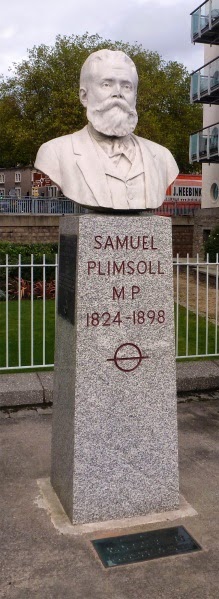
Samuel Plimsoll’s Address to the Cleveland Ironstone Miners, Saltburn 1874
 Some of the Tweddell descendants now live in and around Bristol and often pass by the statue of Samuel Plimsoll MP and, until recently had no idea there was any link between their forebear from Stokesley – George Markham Tweddell (GMT), North Yorkshire and Samuel Plimsoll. However it was known the GMT had associations with the Cleveland Ironstone Miners Union through the work of Tony Nicholson who in his MA thesis of 1982 –
Some of the Tweddell descendants now live in and around Bristol and often pass by the statue of Samuel Plimsoll MP and, until recently had no idea there was any link between their forebear from Stokesley – George Markham Tweddell (GMT), North Yorkshire and Samuel Plimsoll. However it was known the GMT had associations with the Cleveland Ironstone Miners Union through the work of Tony Nicholson who in his MA thesis of 1982 –
The growth of trade unionism amongst the Cleveland Ironstone Miners 1850-1876: T Nicholson. Nicholson, T; Department of Humanities. Book. English.
Published Teesside Polytechnic : Department of Humanities 1982
mentions the role of GMT in respect to the union. (I hope to make some notes from Tony’s dissertation soon to put on here.)
I am thankful to the Labour Councillor for Redcar and Cleveland – David Walsh for sending me two cuttings from the Middlesbrough – Daily Gazette 1874 and 1875, which are verbatim reports of the East Cleveland Ironstone Miners annual political meetings. This was prompted by the launch of the second part of Sheila Crossman’s book on Joseph Shepherd, which, as described by the Northern Echo recently is – http://www.thenorthernecho.co.uk/history/memories/11265880.Engineers_of_change/
“JOSEPH SHEPHERD is the “miners’ champion” in the title of a new book by Sheila Crossman of Guisborough. Joseph was the first secretary of the Cleveland Miners’ Association who tried to organise the ironstone workers to get a fairer deal from their bosses, including Sir Joseph Whitwell Pease of Darlington. The 1870s were fractious times, of strikes and lock-outs, of blacklegs and boycotts, with the men not knowing how to unite and often distrusting their own leaders as much as the mineowners…..”
Shepherd, down the pit at the age of nine, formed the Cleveland Miners Association in 1872, from what
Sheila terms his “power base” at Brotton. The terms may never before have been used in the same sentence. The union was manifestly needed. They were ironstone miners, maybe 10,000 men and boys between the Tees and Whitby working 12-hour shifts winter and summer. Wages hadn’t increased for 14 years, conditions were lethal. Alexander MacDonald, the miners’ national president, reported that he had seen “more crutches, more lame men, more blind men in Cleveland than all the other mining districts in the country.”
The Middlesbrough Exchange, a newspaper, was blunter yet. “The men are not cared for so much as a dog.” It concluded. The masters occupied the grandest halls in the district, most of which survive.”
Thousands of miners formed themselves into lodges with heliotropic names like Rose of Summer, Flower of Cleveland and Lily of the Valley.
The Miners’ Champion and the second part The Forgotten Man are both available for £10 each from Guisborough Bookshop, Kirkleatham Museum, Cleveland Ironstone Mining Museum and Whitby Bookshop or, with £2 added for post and packing, from the author at 48 Deepdale, Guisborough TS14 8JY.”
was holidaying in Redcar when, noticing the number of wrecks, he was “inspired” to invent the Plimsoll Line as a sort of loading gauge.” There is a blue plaque to Plimsoll above what is now Marks and Spencer in Redcar marking where he is said to have taken his rest. The plaque reads: “Samuel Plimsoll “The Sailors’ Friend” While staying in a house on this site he was inspired to invent the Plimsoll Line a safety mark for loading ships in 1876“
September 7, 1874
CLEVELAND MINERS’ ANNUAL POLITICAL DEMONSTRATION.
 |
| Samuel Plimsoll from Look and Learn |
PLIMSOLL, M.P., ON THE FRANCHISE.
SATURDAY, THE CLEVELAND IRONSTONE MINERS HELD THEIR ANNUAL POLITICAL DEMONSTRATION.
annual political demonstration at Saltburn. Early in the day that
pleasant seaside resort began to present a lively appearance. Groups
of men, women and children began to power into the town by road and
rail, and later in the day the various lodges of the association made
their appearance, some preceded by their banners and bands. About
four thousand persons were present, which – taking into
consideration and the fact that the weather was extremely
threatening, may be counted a fair muster. Although the sky was
frequently covered with clouds which looked black and ominous, the
rain happily kept off until the meeting was concluded, and then, to
make up for its forbearance, came down in a steady pour. The meeting
was held in a field opposite the Convalescent Home, and a platform
was extemporised from a couple of wagons which were sheltered from
the wind by a snug haystack.
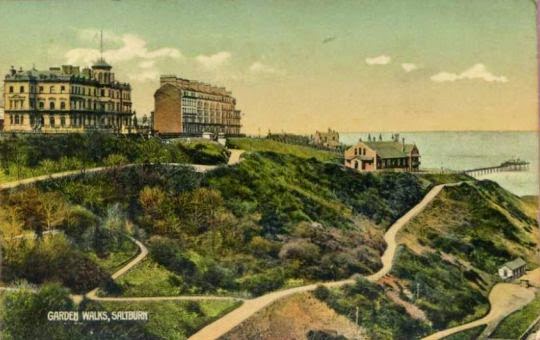 |
| Saltburn by the Sea |
over the meeting, and was supported on the platform by Mr Plimsoll,
MP; Mr Lloyd Jones, Mr Cudlip, Mr Stephen Emmerson, and others.
that he was supported by such able speakers,
and it would be wrong of
him to occupy that time that ought to be devoted to them. They
regularly made it a practice to hold a meeting every year, which took
the form of a political demonstration, because they considered there
were several things that disgraced the statute book, and they held
that the means of getting rid of those obnoxious matters, was by
holding similar to that. He trusted they would never grow
faint-hearted, but persevere until they got rid of the many
objectionable things they had to complain of, which would be referred
to that afternoon.
resolution which was as follows; –
system of parliamentary representation is a most flagrant violation
of acknowledged rights, and therefore pledges itself to do its utmost
to bring about an assimilation of the Borough and County franchise.”
welfare of the country would acknowledge that it was only right that
those who contributed to the wealth of the nation should have a voice
in making the laws they were called upon to obey. To insist upon a
man conforming to a law he had no voice in making., although he is
compelled to contribute towards the legal ordinances of the country,
was a flagrant act of injustice, and demanded immediate and positive
attention. (Hear Hear.) he sincerely hoped that they would not only
support the resolution but they would also commence co-operative
industrial societies amongst themselves throughout the whole of
Cleveland, and if they kept themselves banded together, before many
years passed over the Government would be only too glad to give them
the franchise.
resolution. He said that when he looked round that assemblage , and
considered how few amongst them had the vote or a voice in sending a
representative to Parliament, he could not help thinking what an
important duty was incumbent on each one of them not to rest
satisfied until they had an assimilation of the borough and county
franchise. (Applause). He considered it a great injustice that
intelligent and thinking men in the country should not be allowed to
be equal with those in the borough. (Hear hear and applause).
which was the signal for an outburst of
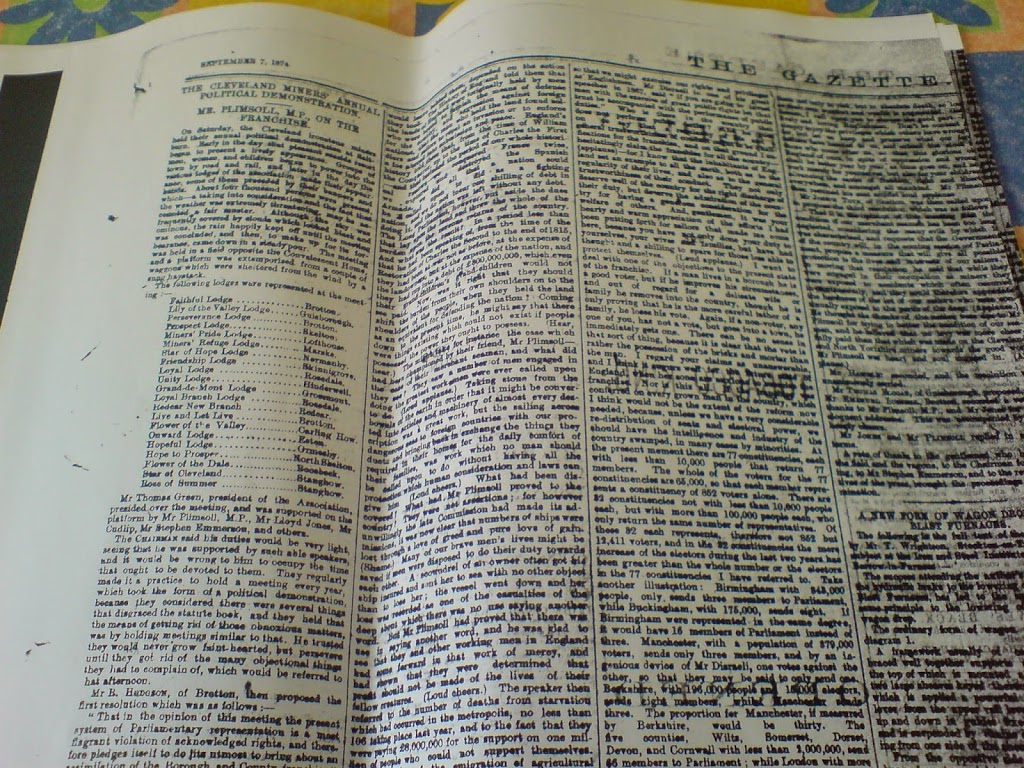 |
| The article as it appears in the Daily Gazette 1874 |
enthusiastic applause. He
said he was there that day at the request of their Committee to say a
few words to them on the assimilation of the Borough and Country
franchise. What was really meant by that phrase was that people
living outside the boundary of parliamentary boroughs should enjoy
their rights of citizenship just the same as if they lived within
those boundaries ; in other words, that when one man possessed the
privileges of citizenship under the law, the law should be equal and
confer the same privileges on other men of a like description. He
remembered when parliamentary reform first began to be seriously
talked about or rather when the masses of the people first moved for
the purpose of improving the representation of the country. Many of
them, no doubt, thought that things used to be pretty much the way
they are now. He could tell them, however, that within his memory,
and when he first began to listen to the voices of those who were
called agitators, that nearly all the great communities of the
country were entirely without representation. Members of Parliament
were returned for small places where there scarcely any inhabitants
whatever, as for instance, Old Serum, where there was not one single
inhabitant, and where, when election time came round, a tent had to
be erected in which a few of the Burgesses of Salisbury assembled for
the purpose of returning two members to parliament. (Laughter).
Another similar case was a borough in Surrey called Detton. The
proprietor was a baronet named Sir Mark Wood and he and his son and
butler were the only voters and they returned two members to
parliament. (Renewed laughter). Once one of the members died, when
the son was travelling on the continent, and Sir mark having
quarrelled with his butler, and wishing to have his son returned had
an insurmountable difficulty to contend with, for whom when Sir Mark
proposed his son, the butler refused to second him and before the son
could obtain the seat, the thing had to be made all right as far as
the butler was concerned. (Loud laughter) Now, at that time, the
great town of Manchester, with its hundreds and thousands of
inhabitants, returned no member to parliament. The great town of
Birmingham, filled with an active, industrious and intelligent
population, had no representation in parliament ; and when he spoke
of those two great towns, he simply spoke of them as a sample of a
large number of places which had no representation whatever. When the
public became alive in this state of things, and insisted in its
being altered, there were hundreds of gentlemen in the British
parliament, and hundreds and thousands outside who declared that
things were just as well as they could possibly be, and that if they
interfered with what was called the British Constitution the sky sky
would fall, and nothing but ruin would come upon the country. But an
alternative came, representation was given where the population of
the country was greatest, and where the wealth and intelligence of
the country was centred : and was there anyone who knew what the
country was at the time he had been referring to, and what it was
now, who would not say that that change had been a beneficial change
for the country? (Cheers) No one can deny it and be held that the
Legislature would be justified by all that had been done in the past
in enlarging the liberties of the people. Why should they at Saltburn
be forced at a disadvantage with the same class of men who live in a
borough? What had they done that they should be excluded from the
benefits of the laws and the privileges enjoyed by their brethren in
large towns? He considered it was the duty of every man who could
drew upon any distinction between what was politically right and what
was politically wrong, to endeavour to get justice extended to the
masses of people. (Applause) Every man, of whatever class or
condition, had an interest in the welfare of his country, and, though
a working man’s stake was not so large as the stakes of those who
owned ironstone mines, coal mines, factories, landed estates etc., a
man’s patriotism should not be measured by the extent of his
possessions. (Hear hear – applause).
was only when they conferred power over the whole nation, when it
ceased to be a class power and became a national power, that it would
enjoy its greatest prosperity, and the future fates of those they
would leave behind them, depended on the action they took. The
history of England told them that the lands of England were
originally held by men who were bound to furnish the means of defence
for the country, and aggression against foreign nations, that the men
who held the land found soldiers and sailors to repel an invasion or
to enforce a foe abroad into submission or peace. England’s history
told them that, from the time of William the Conqueror, up to the
time of Charles the First – and that included the period of our
whole historical renown – we conquered France twice, we captured
and destroyed the Spanish Armada, we did all that a nation could be
called upon to do, as a fighting nation, and we do not incur one
shilling of debt in doing it, and the nation was left without any
debt. The Long Parliament, however, put aside the dues that lay upon
the land and threw the whole of the burden upon revenue returns of
the country. And what was the result? In a period less than that he
had been speaking of, from the time of the restoration of Charles the
Second to the end of 1815, they had run into a debt of £800,000,000,
which, even their great grand children’s, grand children would not
see paid. Now was it right that they should shift the burden from
their own shoulders on to the shoulders of the people, when
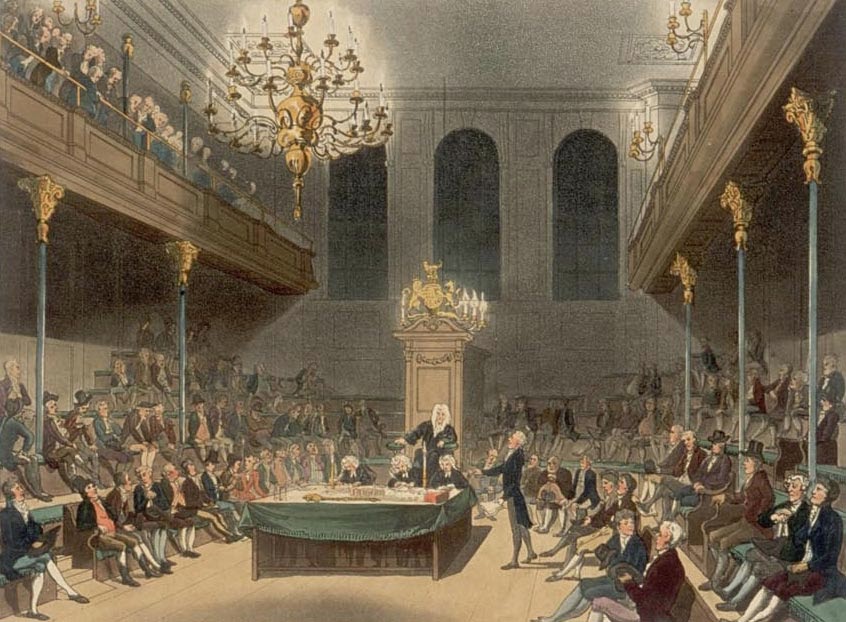 |
| House of Commons |
they held
the land as an equivalent for defending the nation? Coming down to
present time, he might say that there were things existing which
could not exist if people possessed the power they ought to possess.
(Hear hear). They might take, for instance, the case which had been
championed by their friend, Mr Plimsoll – the case of the Merchant
seamen, and what did they see? They saw a number of men engaged in
doing the greatest work men were ever called upon to do. (Loud
applause) Taking stone from the bowls of the earth in order that it
might be converted into articles of machinery of almost every
description was a great work, but the sailing across dangerous seas
to foreign countries with our products and bringing back in exchange
the things they required in their homes for the daily comfort of
their families, was work which no man should be called upon to do
without having all the protection which human consideration and laws
can give him (loud cheers) What had been discovered? What had Mr
Plimsoll proved to the country? They were not assertions ; for however
unwillingly the late commission had made its admissions, it was now
clear that numbers of ships were lost through a love of greed and
pure love of gain. (Shame) Many of our brave men’s lives might be
saved if men
were disposed to do their duty towards each other. A
scoundrel of an owner often got his ship insured and sent her to sea
with no other object than to lose her ; the vessel went down and her
load was recorded as one of the casualties of the deep about which
there was no use saying another word. But Mr. Plimsoll had proved
that there was use in saying another word, and he was glad to see
that they and other working men in England had come forward in that
work of mercy, and had shown that they were determined to that
profit should not be made of the lives of their fellow creatures.
(Loud Cheers). The speaker then referred to the number of deaths
from starvation which had occurred in the metropolis, no less than
106 taking place last year, and to the fact that they were paying
£8,000,000 for the support on one million of people who could not
support themselves. He also spoke of the emigration of agricultural
labourers, which, he said had almost amounted to a general exodus,
and these and other matters he might name showed the want of better
Government, for a rich country like theirs ought to govern her people
in comfort. (Applause) To bring about that end a better
representation was needed, and he hoped the day was not now far off
when they would obtain their just rights by the assimilation of the
Borough and Country Franchise (Loud Applause).
resolution as follows – “That this meeting hears with regret that
the criminal clauses of the Masters and Servants act and the laws
known as the Criminal Law Amendment Act still disgrace the statute
book. It is obliged therefore, to repeat its expression of
indignation because of this piece of class legislation, and hopes
that the present Government inquiry will result in a thorough
renovation of these Acts to a repeal of the disgraceful clauses..”
– In bringing that subject before them he said there could be no
doubt that those obnoxious clauses ought to be at once repealed. He
saw that Mr MacDonald, in a speech at the Durham Miners’
Demonstration, urged them to send in a petition on the subject which
would the table of the House of Commons to groan under its weight,
and he hoped that suggestion would not be lost sight of. (Cheers)
resolution, said that he the ‘Masters and Servants’ Act was
unquestionably one law for the Masters and one law for the servants.
The 9th clause provides that where a workman broke a
contract, he could sent to prison for three months, and where a
Master broke it there was no such punishment as imprisonment. The
14th clause of the same Act he regarded as a helpmate for
the other, and he thought it was their duty to agitate until the
above clauses were repealed.
the resolution. He had travelled 700 miles to be with them that day,
and he hoped they would award him a hearty reception. (Loud
Applause).
Chairman, ladies and Gentlemen, with a large number of politicians,
‘rest and be thankful‘ seems a favourite motto. Be thankful as much
as you like but I think there is too much work that wants doing, for
this time of rest to be said to have arrived. Many things inflict
society at present, and I will just enumerate a few of them and it
will require hard work to put them right.. We have petty offenders
against the laws who must always be the vast majority of those who
are subject to the penalties of those laws, but up before those who’s
interests are diametrically the opposed to themselves. We have an
unpaid magistracy, unpaid and untrained and not merely unpaid but
inefficient. I would like to see a time when game preservers would no
longer sit in judgement over poachers, manufacturers over artisans,
or ship-owners over sailors. (hear hear).
and will hold the scales of justice with an even and steady hand.
Another matter which may well engage our attention is the prosecution
of offences against the person or property. These are at present
left in private hands, but I trust we shall soon have public
prosecutors, so as to do away with the scandal of having the criminal
law put in operation by private and irresponsible persons for the
purpose of extorting money by force from others. Then, gentlemen,
there is the Criminal Law Amendment Act , and the group of measures
generally understood when that term is used, the law of conspiracy,
and the masters and servants act. These three all person acknowledge,
require considerable amendment, and I am in great hope that the next
session of parliament will not pass without some satisfactory
measures on these subjects being passed. The law of Masters and
Servants or a similar law operates particularly hard in the case of
sailors. We have these men continually sent to prison, simply because
they refuse to go to sea because the ship is too deeply loaded, and
they have not a chance for their lives, and if they refuse , they are
brought up before some ship-owning magistrates and their only choice
is – go to sea or go to prison. Such cases are happening
continually. Last year 600 men were sent to gaol, and maintained
there at your expense and mine, simply because they had a proper
objection to being drowned by the dozen and the score. There are many
other matters which require attention, but which the present system
of selecting representatives in Parliament, they have not that chance
of being attended to which they would have if the whole machinery of
Government was improved. I want to see such a re-distribution of
electoral power, as will ensure that the people be represented as
that capitalists.. At present the House of Commons consists far too
largely of men whose only interest is keeping what they have, and
adding more to it. They do as might be expected. They pass laws in
their own interest. When the landlords were predominant, they not
only shifted the burdens on the land upon the country, but in order
to make the land yield more profit, they taxed all corn brought from
abroad into the country, with the view of raising the price of corn
grown at home. I am thankful to say that their power seems to have
passed away, and we seem likely to have better times in the future. I
would rather that the object of the meeting not been so much the
assimilation of the Borough and the County franchise as that we had
taken the whole subject fairly in hand, and advocated that the
distinction between Borough and the county voters is artificial and
mischievous, and that that I can see no reason for keeping it up. I
think it would be greatly to the advantage of the English nation,
that instead of of boroughs and counties we had electoral districts,
so that there would be no distinction between dwellers in towns and
counties, so that we might exercise our rights and privileges as
Englishmen. Mr Disraeli in one of his great speeches in 1867, said
“If you are going to invest in men with
| Benjamin Disraeli |
the exercise of great
public rights let that trust be accompanied with the performance of
public duties.” Who is there in the country that does not perform
public duties? And he goes on to say that regularity of life and a
general trustworthiness of conduct ought to be qualifications for the
franchise, and on that ground I unhesitatingly claim, the franchise
for all the country – (Applause). For I know that the inhabitants
of England set an example to all on earth, both as to the regularity
of their lives, and also as to the general trustworthiness of their
conduct. They not only deserve well of the country for the right to
discharge of their duty, but deserve the admiration of the country
for having a general consideration for the welfare of others. And
gentlemen , it was your hearty and warm appreciation of the efforts I
had been putting forth for sailors that made me come here, because
you have not only done your duty to yourselves and your wives and
families, but have had thought and a shilling to spare for those less
able to protect themselves. (Loud applause) I want to deal with one
of the objections to the present state of the franchise. If a man
lives in a borough he is a good voter, but if he improves his
circumstances and out of regard for a delicate wife or family he
removes to the country, though he is only proving that he is the more
careful father of a family, he loses his vote. Again, if a non voter,
any one of you, has not a vote, but goes into a town, he immediately
gets one. There can be no sense in that sort of thing, because it is
clear that the vote is rather the possession of the bricks and mortar
than the man. I regard your claims as unanswerable and I think it
augers well for the future state of England, when her sons are
anxious to obtain(?) The franchise. Nor is this all. If the franchise
was conferred on every grown man in the country, which I think would
not be the extent of the reform now needed, because unless we have a
very considerable re-distribution of seats and electoral power, we
should have the intelligence and industry of the country swamped, in
many cases by minorities. At the present moment there are 77
constituencies, each with less than 10,000 people that return 77
members. The whole of the voters for the 77 constituencies are
65,000, so that each member represents a a constituency of of 852
voters alone. There are 82 constituencies not with less than 10,000
people each, who only return the same number of representatives. Of
these 82 each represents, therefore not 852 but 12,411 voters, and 82
constituencies the more increase of the electors during the last two
years has been greater than the whole number or the electors in the
77 constituencies I have referred to. Take another illustration :
Birmingham with 343,000 people, only sends three members to
Parliament, while Buckingham, with 175,000, sends 8. If Birmingham
were represented in the same degree it would have 16 members of
Parliament instead of three. Manchester, with a population of 379,000
voters, sends only 3 members, and by an ingenious device of Mr
Disraeli, one votes against the other, so that they may be said to
only send one. Berkshire, with 196,000 people and 15,000 electors
sends 8 members, while Manchester sends 3. The proportion for
Manchester, if measured by Berkshire, would be thirty. The five
counties, Wilts, Somerset, Dorset, Devon and Cornwall with less than
2,000,00, send 66 members to Parliament ; while London with more than
3,000,000, only sends 22 or one third, while in population it ought
to send 120. These facts gentlemen, will show that great changes are
needed, over and above the mere giving the vote to those who live in
the country. We must have something approximate to electoral
districts before we can be said to have attained to full
representation of the country. Theses are not merely the arguments of
the platform agitator, because the Times says the anomalies in
the distribution of electoral power are gross and untenable. But you
must not suppose that because the case is so strong, and the thing
seems so reasonable that we shall get it without a struggle.
Instance, the state of things described by Mr Jones, as proceeding
the passing of the Reform Act of 1832. That change was not brought
about without a great struggle. If there were those who were ready to
defend, and did defend the then existing state of things with very
great force, they must not suppose that men would be wanting to
oppose the reform which we contend is so much needed. I happened to
be at that place Mr Jones was describing, Old Sarum, on
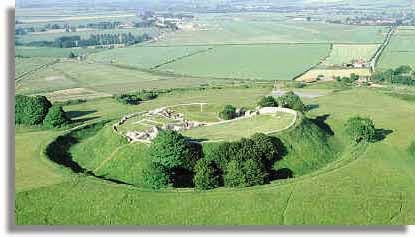 |
| Old Sarum |
Tuesday, and
it is just at the top of a hill like Roseberry Topping. As Mr Jones
said, for many many years after there had ceased to be a single house
the owners of the acres met under a tree to decide which two electors
should be the members of Parliament . The only inhabitants that I
could see were partridges and rabbits (laughter) – so that they went
to represent them in place of men. We must not only have these things
I have spoken of secured and freed, but have also a fair and full
expression of the national will. And I hold it to be necessary that
all classes should not only vote for representatives, but that they
should send them from their own ranks. – (Applause) and that there
should be members of the House of Commons drawn from every class of
society. (Applause) If this is to be, we must have, I don;t say
payment of members, gentlemen but something like what we have for
cabinet ministers. If a man has been a cabinet minister, and held
office for five years and retires, he is at liberty to say he cannot
afford to live without a salary. It is not given to all as a rule,
but it is to enable men of genuine, who have given their services to
the State, to be maintained, and if it is not beneath the dignity of
a Cabinet minister to accept a pension from the state, I can’t see
how it would degrade a member of Parliament, if he was a working man.
I think that something like that, partially limited to working men,
would be a deal better than making it common to all. I think it would
be a pity to run any risk of destroying the force of attraction which
is supposed to attach to the office, seeing that it draws to the
services of the state, men whose services we could badly do without,
and which attraction proves an inducement to men of high culture in
the house, to have working men representatives and I don;t see how
this is to be accomplished, unless they are paid. We must also have
the cost of elections to municipalities. I think if we arrive at this
we shall have a fair chance of having such an infusion of fresh blood
into the house as to enable us to secure fresh ability, and we shall
have good legislation becoming much easier, and if anybody in the
future should find a great and intolerable injustice. Three weeks ago
I was looking out at sea from the watering place of Clifton near
Bristol, on the
Severn, and I saw a large vessel that was going to
sea. She was nearly overhead in the water, and had a bad list, and
was helplessly drifting about. Three days after that I read that a
large vessel had been lost off Bude, and twenty men drowned. I don;t
know that it was the same ship that I saw, but I am having an inquiry
made into it. I do say this, and I challenge any man out of bedlam to
contradict it, that we have every week and every month dozens and
scores of hard-working men, men with wives and children, whose lives
are as precious to them as your are, that you sent down to death for
nothing on earth except to enable some greedy scoundrel that cares
nothing for his fellow men, to add to his wealth ; and, please God,
we will stop it. (Loud applause) These things cannot be put right
without effort. – A great deal has been done since the time Mr Jones
referred to. We have had men who lived before us that laboured hard
for us, and who were put in prison and tried for the lives. Shall we
do nothing for those who come after us? Seeing we enjoy so much of
what has been obtained for us by those who preceded us – let us do
our part and leave the world better than we found it. Your children
will be better off, politically, than you are, or worse ; for the
retrograde. But we shall find and of this we are well satisfied, that
unless we are watchful and vigilant to our children, we shall find a
new race of oppressors rise up in the pampered purse-proud
capitalists, and in those who get their living by employing others. I
know there are many noble men amongst capitalists. I do not wish to
say anything against them but I do say that a great many who have not
brains, and who think they discharge and by lavish outlay upon
themselves. They that desires, instead of trying to make the world a
better than it was before and those who are eager to stand in great
places are not only willing to inconvenience the working classes,but
in order to get rich they are willing, as in the case I have given,
to expose them not only to risk, but to absolute death, so long as
their own comfort and wealth is augmented. Gentlemen, I call upon you
to choose the good part, lively and loving Englishmen. Don;t be
content simply to enjoy the privileges which others have wrought
for, but let us keep and preserve what our forefathers have handed to
us and extend the stock to those who come after us, so that this
glorious old England of ours, in spite of oppression and wrong, shall
be better year by year, as time goes on and not work merely for
yourselves, but also for your children, advancing the cause of
freedom, rights and liberties everywhere, amongst all mankind. Mr
Plimsoll then resumed his seat amid loud applause.
third resolution, which was as follows –
condition of our Merchant seamen has been too long neglected,
considering the many evils by which it was characterised, and
requests that the Government of the country will, in the coming
session of Parliament. Propose a measure that will give all possible
protection to the lives of and interests of our sailors.”
moving that resolution, he said that while they they were engaged in
their occupation as miners they were exposed to accidents which
often occur instantaneous and they should appreciate the lot of our
sailors who were continually exposed to the perils of the deep
(Applause). He thought the thanks of the meeting were due to Mr
Plimsoll for trying to better the conditions of our seamen, and he
believed that no levy was more cheerfully paid than that which was
made on the Cleveland and North Yorkshire miners towards the good
work that Mr Plimsoll was heart and soul engaged in. (Applause)
carried .
EMMANUEL RUSSELL of Brotton seconded a vote of thanks to Mr
Plimsoll MP and Mr Jones for their eloquent addresses. This was
accompanied by three hearty cheers. Mr Plimsoll and Mr Jones replied
in suitable terms.
and the wagons , to the Chairman for presiding , to Mr Stephen
Emmerson, and to the representatives of the press brought the
proceedings to a termination.
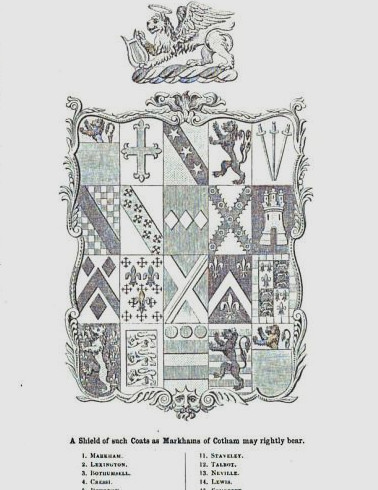
George Markham Tweddell and the Markham Family
George Markham Tweddell and the Markham Family
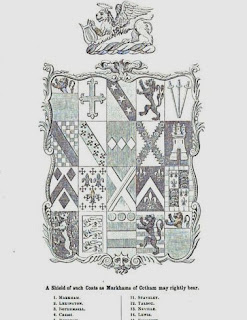 |
| The Markham Coat of Arms |
This post is an attempt to bring together what we know of George Markham Tweddell’s (GMT) relation Paul Markham Tweddell, who until is death in 2010, spent many years researching his ancestors, and in association with me, making much of that research available on the internet. His full genealogical book, unfinished at his demise, is currently being prepared for publication by Paul’s wife, Sandra but may take a while as a lot of Paul’s later research still needs to be integrated into the text. Paul’s book covers the full Tweddell family history.
to his father’s family – the Markhams. I pull together material from
From Paul Tweddell’s website http://www.tweddellhistory.co.uk/
“George Tweddell (the name by which he was baptised) was born on 20th March 1823 and claimed he was the son of a Royal Navy Lieutenant, George Markham, who had been born in 1797 in the Rectory, Stokesley. His father, another George Markham (1763-1822), was the Rector of Stokesley, whilst also holding the post of Dean of York, and his grandfather was Archbishop Markham (1719-1807), famed for saving the walls of York from demolition in the first decade of the nineteenth century with the help of the author Walter Scott.“
The Plantagenets and Cromwell
On one of our walks through Stokesley, taking me along his ‘Tweddell Trail’, Paul mentioned that through the
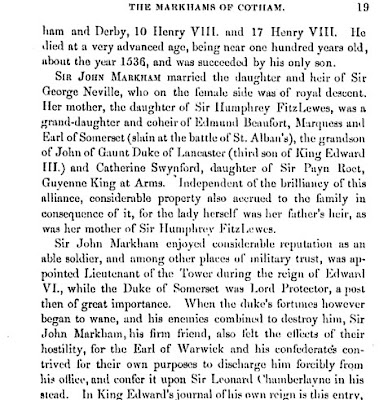 |
| Sir Clements Markham’s family history of 1913 |
Markham line, GMT was related both to Kings (the Plantagenet line) AND Oliver Cromwell! (GMT mentions the relation to Oliver Cromwell in Bards and Authors of Cleveland and South Durham and in the page pictured here from Sir Clement’s Markham’s Family History of 1913, (link to this book on line below) it says “Sir John Markham was descended through John of Gaunt Duke of Lancaster (third son of King Edward 111)“. Yet, although GMT was estranged from his father’s family, brought up by his mother and living in relative poverty most of his life with no University education, he emerged as an impressive and energetic figure showing no lack of learning, wisdom and enterprise and leaving a large body of work – books, tractates, newspapers and poetry behind him. Long before modern communication systems and the internet, his regional, national and international network – often through the masonic craft, is still being unraveled and marveled at! Looking through Sir Clements book, it’s noticeable that quite a few of the Markhams were also bards and it seems to me that GMT’s ‘lyre’ as he would refer to his muse, fits neatly in with this.
 GMT dedicated his inherited genes in the People’s cause, firmly behind the Chartist movement, anti-slavery, Cleveland News and Stokesley Reporter, established when he was only 19 and written about on this blog. Samuel Johnson wrote in 1775 “I never think I have hit hard unless it rebounds“, Paul and I picked up a pamphlet in the Yorkshire store in Stokesley called the The Stokesley Trail in 2008 and found an entry about GMT on page 29 which amused us a little – in regard to Rose Cottage (the Town House with its ‘fine sepertine bow), it reads –
GMT dedicated his inherited genes in the People’s cause, firmly behind the Chartist movement, anti-slavery, Cleveland News and Stokesley Reporter, established when he was only 19 and written about on this blog. Samuel Johnson wrote in 1775 “I never think I have hit hard unless it rebounds“, Paul and I picked up a pamphlet in the Yorkshire store in Stokesley called the The Stokesley Trail in 2008 and found an entry about GMT on page 29 which amused us a little – in regard to Rose Cottage (the Town House with its ‘fine sepertine bow), it reads –
anti Corn laws and much more and writing a People’s history of Cleveland. His wide body of poetry reveals a man who cared about people and sound values regardless of their social or financial position and envisioned a better world through wider education, culture and progressive political change. Not everyone liked him – you have to look at reaction to his radical paper the
“George Tweddell lived here in the 1800’s, a man of many interests, poet, historian, stirrer-up of controversy, publisher etc.” (My italics). GMT died in 1903 and his reputation still ‘rebounds’ today! Paul thought ‘stirrer up of controversy’ a telling expression and among other things, might be accounted for by his support of the People’s Charter and other political concerns.
Lieutenant, George Markham?
Paul Tweddell tells us –
“Lt Markham had lived an adventurous life in the Royal Navy, had been mentioned in dispatches during the late Napoleonic campaign on the Mediterranean coast of France and was wounded in the Siege of Algiers in 1816. Obviously, one must imagine that his dalliance with Elizabeth Tweddell (1800-1841) while on leave in Stokesley during summer 1822 resulted in George Tweddell’s birth the next year and must have been a typical event in the pre-Victorian period. So too was the way the child was welcomed by this mother’s yeoman family without social problems; George would be perceived as an extra worker in the family’s various enterprises and brought the added advantages of ‘noble blood’ to add it to the Tweddell line. Members of the following generations used to say George had ‘aristocratic hands’, by which they meant broad, long and powerful hands and fingers with slim wrists. But these same people found it difficult to accept the circumstances of George’s birth, living as they did a generation later during Victorian and Edwardian times when the hypocrisy prevalent during the period (what they called ‘respectability’) had taken its grip on changed social norms. The family made up a story to rationalise George’s illegitimacy presumably so they could continue to discuss George’s literary exploits and the glorious history of their Markham ancestors (which stretched back through John of Gaunt to the pre-Norman thane, Claron of West Markham) whilst preserving their own ‘decorum’.”
“Lieutenant George is the subject of a brief chapter (§19) in Sir Clements Markham’s family history of 1913, Markham Memorials, stating that, during the time of his relation with Elizabeth Tweddell (the author makes no mention of it, unsurprisingly), he was suffering from a head injury the result of a fight following a dispute during a gambling game at sea. Perhaps Elizabeth found him an attractive partner – prestigious and courageous but also in need of her feminine reassurance. Although he returned to sea, Lt Markham never recovered from the injury and died in 1834 tended by his second sister, Henrietta Montgomery, at her home, Nunton House near Salisbury where her husband was vicar. Documentary evidence of Lt George’s death was available in George Tweddell’s time in Foster’s Pedigrees of the County Families of Yorkshire (1874), but one must assume he could not have found it, as he leaves a gap for his father’s date of death in his notes, presumably hoping to fill it in when he found it.”
For further research see –
Sir Clements Markham’s family history of 1913 – preview here –
http://books.google.co.uk/books?id=B9s1AAAAMAAJ&printsec=frontcover#v=onepage&q&f=false
GMT Makes Contact with Frederica Havisides née Markham.
Paul Tweddell tells us that “Whilst still in Bury (as Master of the Bury Ragged or Industrial School) c 1855 – 60), George made contact with a member of his father’s family, Frederica Haviside (1798-1863), a younger sister of his father, who lived in the (then rural) Rectory Manor, Walthamstow. In 1859 Frederica sent him two paintings of her house with a dedication recording her gift to him, framed in gilt. By the time Frederica, now widowed, wrote her last will George and Elizabeth were living in Middlesbrough, and when she died in 1863 her will showed she had bequeathed an annuity of £100 per annum (perhaps in today’s money something like £5 or 6000 (roughly £100 a week) for the term of their lives. On the early installments of the bequest the couple set up a business ‘Tweddell and Sons’ as newsagent and printers at 87 Linthorpe Road, Middlesbrough. In gratitude George penned a sonnet to celebrate Frederica’s life. Frederica kept up a correspondence with her nephew before her death.”
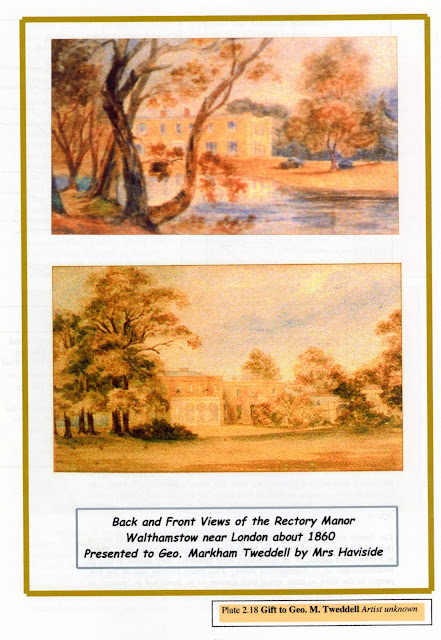 |
| Rectory Manor, Walthamstow 1860 From Paul Tweddell’s book on the Tweddell’s |
In another bio Paul Tweddell tells us – “Shortly after arriving in Bury, Tweddell took the opportunity to add Markham as his middle name; the first recorded mention being written in his hand: ‘Bury, December 15th, 1855’,[xix] (and from then on often appears abbreviated to ‘GMT’). Despite publicising the change in the national Freemason newspaper and what it signified, the Markham family seems to have accepted it. The reason why was to appear shortly after his return northward .
From North of England Tractates No. 7
Cleveland Sonnets (1870)
“Sonnet 10 was addressed to my Father’s sister, Frederica, daughter of the late Dean Markham. She was born at Stokesley Rectory, and ever cherished a strong love for Cleveland. An angel on her sojourn here, she is now one in heaven.George Markham Tweddell Stokesley April 23rd 1870″
–
Whilst in the Cape he journeyed to Algoa Bay to supervise the landing of the organised British immigrants
(whom we refer to as “The Settlers” today). He immediately saw that a sea-port would be necessary if the new settlements in the Eastern Cape were to be viable. On 6 June 1820 he named the site of the landings, and the temporary “tent city”, Port Elizabeth; and arranged land for those who could invest.
In August 1820 he selected the site of today’s Donkin Reserve, as the position to build a memorial to his late wife. In the early 1800s pyramids were a not an uncommon memorial in both India and England, and the one he commissioned was based on that of an ancient Roman, Caius Cestius.”
Read more From http://www.momentos.co.za/donstory.htm
Interestingly Fearon Fallows “was sent to Cape Town by the Royal Astronomical Society to start the Cape Observatory. This was to be the first Astronomical Observatory in the Southern Hemisphere (As well as the first Scientific establishment in the Southern Hemisphere). He was chosen for the post at the Cape because of his skills in mathematics and astronomy. In Cape Town he was well received by the Acting Governor, Sir Rufane Donkin, and the Colonial Secretary,Colonel Bird. Fallows had to set up a temporary observatory to provide time signals and to set make a catalogue of Southern stars. Sir Rufane Donkin had some wooden houses for British settlers in Port Elizabeth. He kindly provided Fallows with a wooden house, which was to serve as a temporary observatory. Fallows was a Freemason at the Good Hope Lodge.” Abridged from http://assa.saao.ac.za/html/his-astr-fallows_f.html
William Markham – Archbishop of York 1719-1807
William Markham was GMT’s great grandfather, famed for saving the walls of York from demolition in the first decade of the nineteenth century with the help of the author Walter Scott.
I won’t comment greatly on William Markham as I would need to study him more closely, but i think this would be essential in any full study of the Archbishop’s great grandson – George Markham Tweddell for the parallels and differences. The Archbishop was the son of major William Markham –
“Son of Major William and Elizabeth. He was born at Kinsale in co.Cork on 9 April 1719 and attended Westminster School and Christ Church, Oxford. After ordination he took up teaching and became Head Master of his old school in 1753. Later he held the post of chaplain to George II, and served as prebendary of Durham Cathedral, Dean of Rochester, Dean of Christ Church, Bishop of Chester and lastly Archbishop of York and Lord High Almoner. On 16 June 1759 in London he married Sarah, daughter of John Goddard a merchant at Rotterdam. Sarah was born in Holland 14 February 1739 and died 26 January 1814.” http://www.westminster-abbey.org/our-history/people/markham-family
In relation to Archbishop Markham, I refer you to Sir Robert Clement’s “A Memoir of Archbishop William Markham” which can be read on line or downloaded as a PDF on Open Library here http://archive.org/details/memoirofarchbish00markiala
It explains the family’s loss of inheritance and the struggle to recover from it that affected the early life of the Archbishop. He and his father were Whigs and supporters of the ‘Glorious Revolution‘ and although the principles of that were strong in the family, Archbishop Markham, the book explains, was a critic of Richard Price and the American Revolution on the grounds that the Glorious revolution was founded on the supremacy of law, while the American Revolution as deemed to be lawless. A full account of this and the reasons given are in the above book p 46-49.
I feel sure that Richard Price would have been someone GMT would have supported with his connections with the Unitarian Church and ideas on egalitarianism and although i haven’t found anything yet, there may well be some reference to Price in Tweddell’s work somewhere –
“Richard Price (23 February 1723 – 19 April 1791) was a Welsh moral philosopher and preacher in the
tradition of English Dissenters, and a political pamphleteer, active in radical, republican, and liberal causes such as the American Revolution. He fostered connections between a large number of people, including writers of theConstitution of the United States. He spent most of his adult life as minister of Newington Green Unitarian Church, where possibly the congregant he most influenced was early feminist Mary Wollstonecraft, who extended his ideas on the egalitarianism inherent in the spirit of the French Revolution to encompass women’s rights as well. In addition to his work as a moral and political philosopher, he also wrote on issues of statistics and finance, and was inducted into the Royal Society for these contributions.”
http://en.wikipedia.org/wiki/Richard_Price
Archbishop Markham was a poet, often writing in Latin (including a Latin version of Shakespeare’s Seven Ages of Man) and a close friend and supporter of Edmund Burke (as described in the book). Burke was a supporter of the American revolutionaries but not the French which led him to move to the right of the Whig party.
George Markham Dean of York – Rector of Stokesley 1763 – 1822
George Markham was GMT’s grandfather, living at the Rectory in Stokesley until not long before GMT’sAlice Barrigan in her essay
 |
| George Markham – Dean of York |
birth when he died in 1822. George was, according to local historian –
Radicalism in Stokesley in the 1820s – herehttp://northyorkshirehistory.blogspot.co.uk/2012/11/radicalism-in-stokesley-in-1820s.html
Robert Armstrong – owner of a Zetetic bookshop in Stokesley, publishing the likes of Thomas Paine and involved in a Stokesley ‘paper war‘, similar to the one GMT would be involved with 20 years later in regard to his own radical newspaper – is shown by Alice to have admired the Dean of York – George Markham as follows –
“The position of the Stokesley Deists was rather more nuanced and the rift between Church and chapel was growing. According to Robert Armstrong‘s third letter of 3 November 1822, he himself
“frequently derived both pleasure and improvement from the Sermons of our late Rector, the deservedly lamented Dean of York ; because I considered his Sermons true Deistical and moral compositions”.
“I do sometimes go to Church”,”
Below is from Sir Robert Clement’s Markham’s family history of 1913 (Click link to view this book)
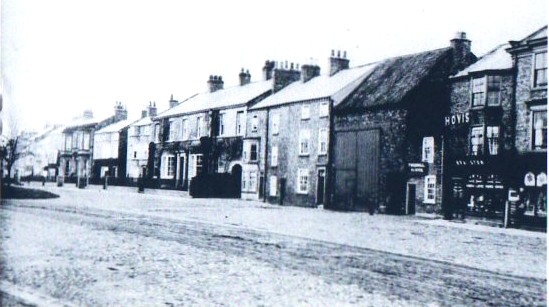
Tweddell And Sons
After a period in Bury as head of Ragged school and a period in Middlesbrough as a printer / publisher, Tweddell set up a print shop in Stokesley in the early 1860’s with his son and compositor Horatio Tweddell. Below is a photo of the print shop in Stokesley (now replaced by flats) and some of Horatio’s print works sent to me by Paul Tweddell. Tweddell and Sons is the small building next to the Hovis sign.



